85% of customers report being dissatisfied with their sales call experiences, according to Salesforce.
This shocking statistic underlines the need to create better sales teams and processes by hiring salespeople and managers and delivering top-quality sales training.
This blog post discusses a central piece of the puzzle for every sales hiring or training process – sales assessment.
Effective sales assessments let you ensure you have a skilled and knowledgeable sales staff who delivers positive customer experiences and makes more sales.
With that said, let’s jump into the post. We’ll start with understanding what sales assessments are and then explore everything you need to know about conducting online sales assessment tests to take your sales game to new heights.
Let’s do this together.
What Is a Sales Assessment?
Sales assessments consist of online tests that evaluate an individual’s sales ability or suitability for a particular sales role. Such tests may feature closed-ended and open-ended questions in various formats, such as multiple-choice, checkbox, fill-in-the-blanks, essay, audio/video response, etc.
You can create salesperson tests to assess various sales-related competencies, such as:
- Knowledge of sales fundamentals
- Core skills include sales prospecting, objection handling, closing, etc.
- Soft skills, such as communication and time management
- Personality traits required to succeed in sales
- Cognitive abilities
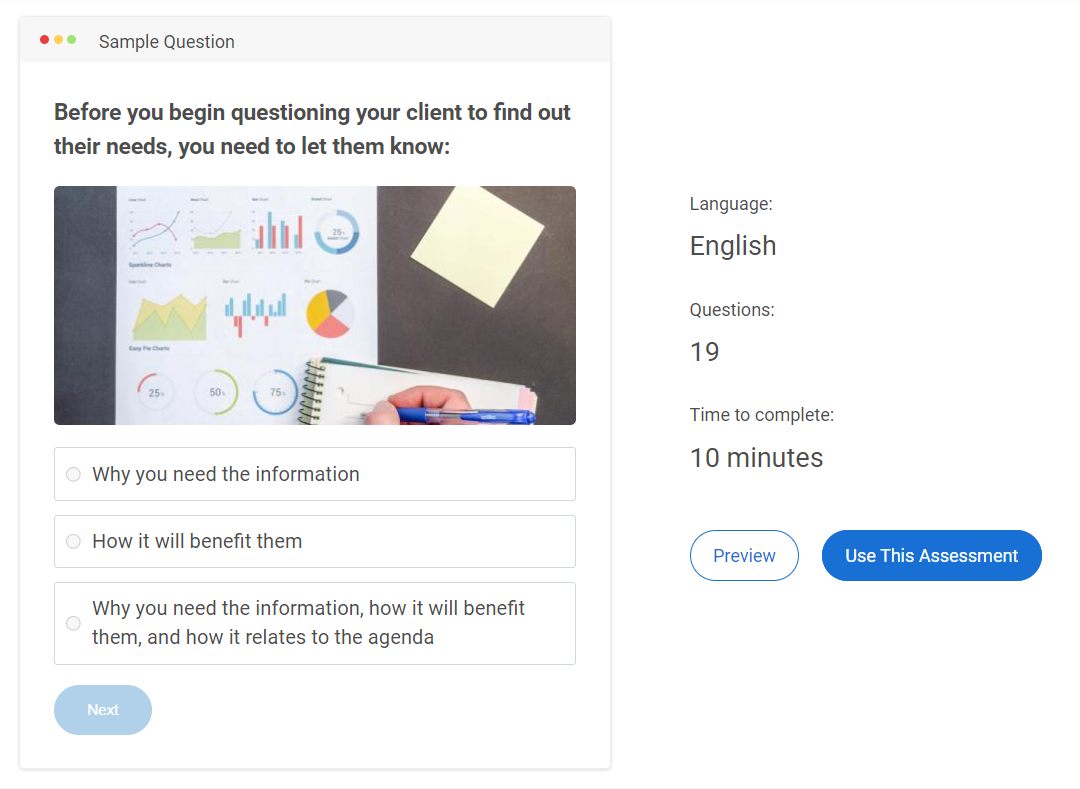
Skills and personality assessments are crucial in sales hiring, training, and succession planning. They help you create the best sales teams while saving time and money.
Next, let’s look at the benefits of online sales assessment tests in detail.
Why Do Companies Use Sales Aptitude Tests?
Now that you know what sales assessment is, let me walk you through the reasons companies use sales aptitude tests. These tests help identify individuals with the innate abilities and competencies necessary for success in sales roles. By using these assessments, companies ensure they hire and retain the best talent, leading to improved sales performance and overall business success.
Key Reasons Companies Use Sales Aptitude Tests:
- Identifying Top Talent: Sales aptitude tests assist in pinpointing candidates who have the natural ability to excel in sales, ensuring investments are made in individuals with the highest potential.
- Objective Evaluation: These tests provide an unbiased method of assessing candidates, reducing the influence of subjective opinions and biases during hiring.
- Efficiency in Hiring: By utilizing a sales assessment procedure, companies can streamline their recruitment process, quickly filtering out candidates who may not fit the role well.
- Predicting Performance: Sales aptitude tests are designed to predict how well a candidate will perform in a sales role, aiding companies in making more informed hiring decisions.
- Customized Training: Results from assessments highlight specific areas where new hires might need additional training, allowing for more targeted and effective onboarding programs.
- Reducing Turnover: By ensuring new hires have the right skills and fit for the sales role, companies can reduce turnover rates and improve employee retention.
- Benchmarking Skills: Companies can use sales assessment results to benchmark the skills of their current sales team, identifying strengths and areas for improvement to enhance overall team performance.
What Are the Different Types of Sales Assessment Tests?
Sales assessment tests come in various forms, each designed to measure different aspects of a candidate’s suitability for a sales role. Here, we explore the primary types of sales assessment tests and provide examples of common questions used in each type.
1. Sales Skills Assessment Test:
These tests evaluate a candidate’s practical abilities in critical sales, such as prospecting, negotiation, closing, and customer relationship management.
Examples of Sales Skills Assessment Test Questions:
A) Scenario-Based Question: “You have a client who hesitates to purchase due to budget constraints. How would you address their concerns and close the sale?”
- Offer Discounts
- Provide additional value
- Highlight long-term savings
- All of the above
B) Role-Playing Question: “How would you handle a cold call with a potential new customer who has shown interest in your product?”
- Introduce yourself and your company immediately
- Ask open-ended questions to understand their needs
- Push for a quick sale
- End the call if they are not interested
2. Personality Assessment Test:
Personality assessment tests determine if a candidate’s personality traits align with those typically successful in sales roles.
Examples of Personality Assessment Test Questions:
A) Trait-Based Question: “On a scale of 1 to 5, how comfortable are you initiating conversations with strangers?”
- 1-3
- 4-6
- 7-9
- 10
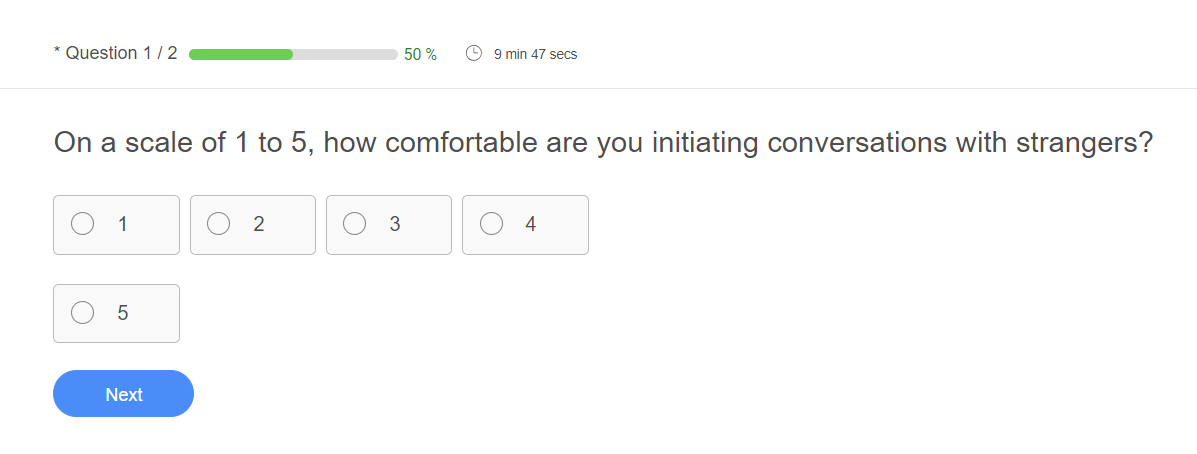
B) Behavioral Question: “Describe a situation where you had to stay motivated despite facing several rejections. How did you manage to stay positive and keep pushing forward?”
- Took a break to recharge
- Sought support from colleagues
- All of the above
3. Cognitive Ability Test:
Cognitive ability tests assess a candidate’s problem-solving skills, logical reasoning, and ability to learn quickly.
Examples of Cognitive Ability Test Questions:
A) Logical Reasoning Question: “If all salespeople are motivated, and some motivated individuals are team players, can we conclude that some salespeople are team players?”
- Yes
- No
- Cannot be determined
B) Numerical Reasoning Question: “A salesperson made $5,000 in sales last month, which was 20% more than the previous month. What were the sales for the previous month?”
- $4,000
- $4,167
- $4,200
- $4,500
4. Emotional Intelligence (EI) Test:
EI tests measure a candidate’s ability to understand and manage emotions and handle interpersonal relationships judiciously and empathetically.
Examples of Emotional Intelligence Test Questions:
A) Self-Awareness Question: “How do you react when a customer becomes upset or angry?”
- Remain calm and listen
- Argue back to defend yourself
- Ignore their concerns
- End the conversation
B) Empathy Question: “Describe a time when you had to put yourself in a client’s shoes to understand their perspective. How did this influence your approach?”
- Changed your sales strategy
- Increased communication frequency
- Offered personalized solutions
- All of the above
5. Situational Judgment Test (SJT):
SJTs present hypothetical, job-related situations where candidates must choose the most appropriate response or rank possible responses in order of effectiveness.
Examples of Situational Judgment Test Questions:
A) Decision-Making Question: “You notice a colleague is struggling with their sales targets, affecting team performance. What would you do to help them improve?”
- Offer to mentor them
- Ignore the situation
- Report them to your manager
- Encourage them to work harder
B) Prioritization Question: “You have several important tasks to complete by the end of the day: follow up with a potential client, prepare a sales report, and attend a team meeting. How would you prioritize these tasks?”
- Follow-up, report, meeting
- Report, meeting, follow-up
- Meeting, follow-up, and report
- Follow-up, meeting, report
6. Sales Knowledge Test:
Sales knowledge tests evaluate candidates’ understanding of sales processes, techniques, and industry-specific knowledge. This type of sales assessment test ensures that candidates have the foundational knowledge necessary for a sales role.
Examples of Sales Knowledge Test Questions:
A) Process-Based Question: “Which of the following is the first step in the sales process?”
- Closing the deal
- Prospecting
- Handling objections
- Follow-up
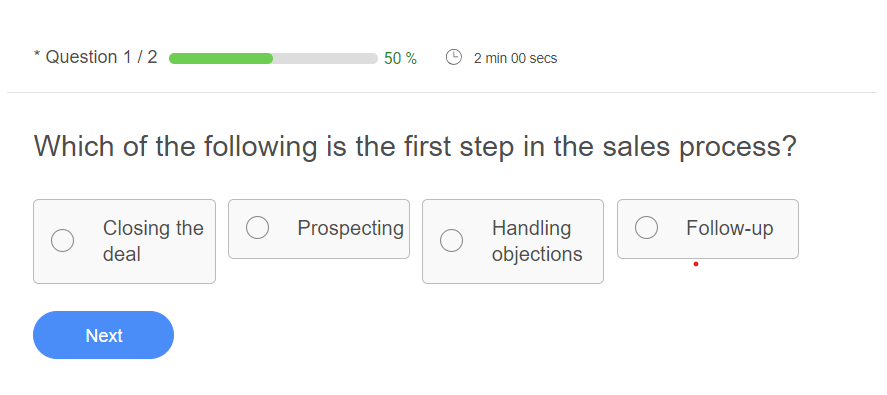
B) Technique-Based Question: “What is the best approach to handling a customer’s objection about the price?”
- Ignore the objection
- Lower the price immediately
- Explain the value and benefits
- Argue with the customer
By utilizing these different tests, companies can ensure they are selecting skilled candidates with the right personality traits and cognitive abilities to excel in sales roles. Finding the best sales assessment test for your organization involves choosing the one that best aligns with your sales strategies and goals.
Benefits of Online Sales Assessment Tests
Sales talent assessments provide many advantages to help you build top sales teams efficiently and skyrocket your sales numbers. Here they are:
1) Hire Better Salespeople
Making bad hiring decisions can hurt your business big time! You may be losing as much as $15,000 every time you onboard a bad-fit candidate. Sales hiring assessments let you avoid this trouble by simplifying your recruitment process and making it more effective.
You can conduct a sales skills assessment test to screen candidates based on their sales knowledge, skills, and general cognitive abilities. Then, you can follow it up with a sales personality test to check if they have the personality, attitude, and drive needed for sales roles and if their values align with your organization’s.
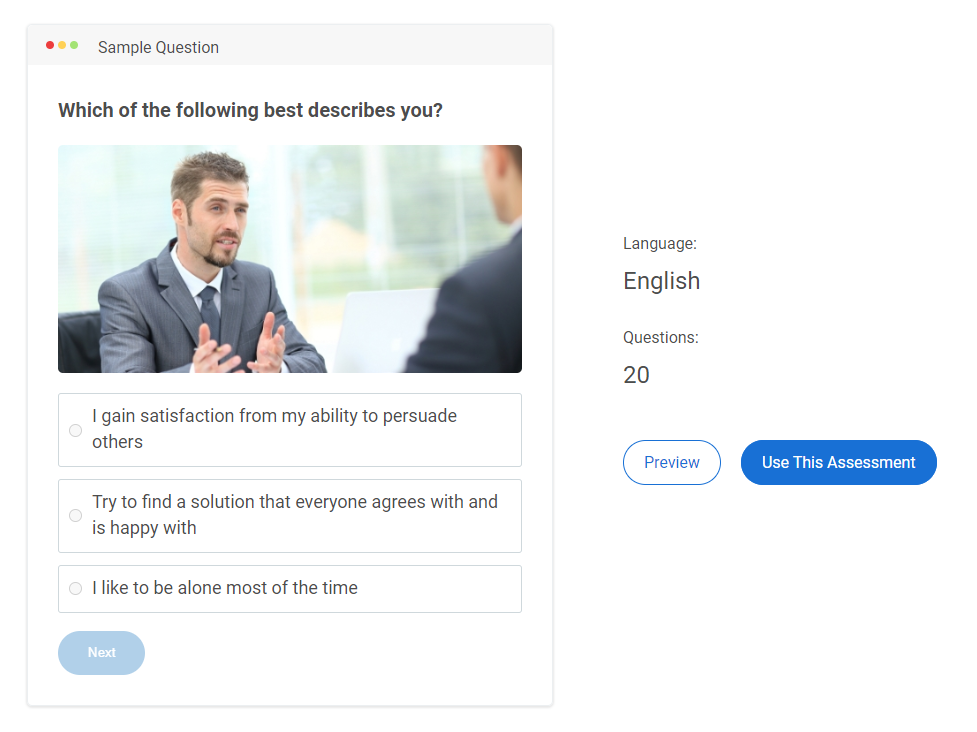
2) Identify Sales Training Needs
The first step in any sales training program should be to find out which employees need training and on what competencies.
How can you do this?
Here’s the answer – a sales training needs assessment.
Online assessment tests make it easy to evaluate employees’ knowledge & skills and identify the scope for improvement via training. Armed with insights gained from an online skill test, you can create a targeted and streamlined sales training program to address all training needs effectively.

3) Deliver Engaging Sales Training & Boost Retention
Besides analyzing training needs, sales assessments play three other critical roles in sales training:
- Formative assessments help make training more engaging by providing an interactive learning experience and improving comprehension through instant feedback.
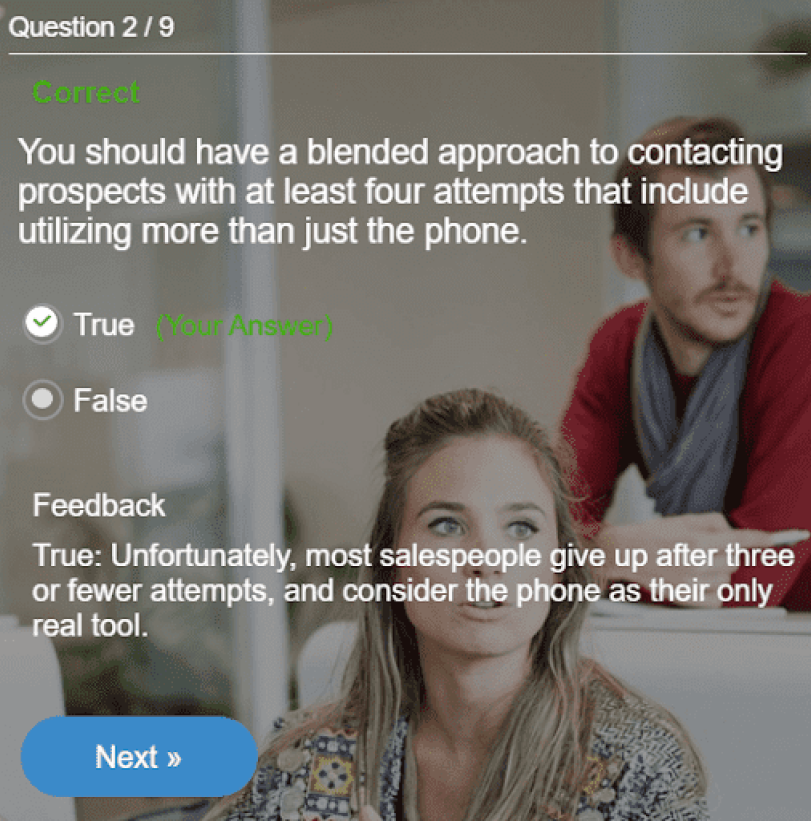
- Summative assessments let you accurately gauge the impact of your training program and provide insights to brainstorm the best training methods.
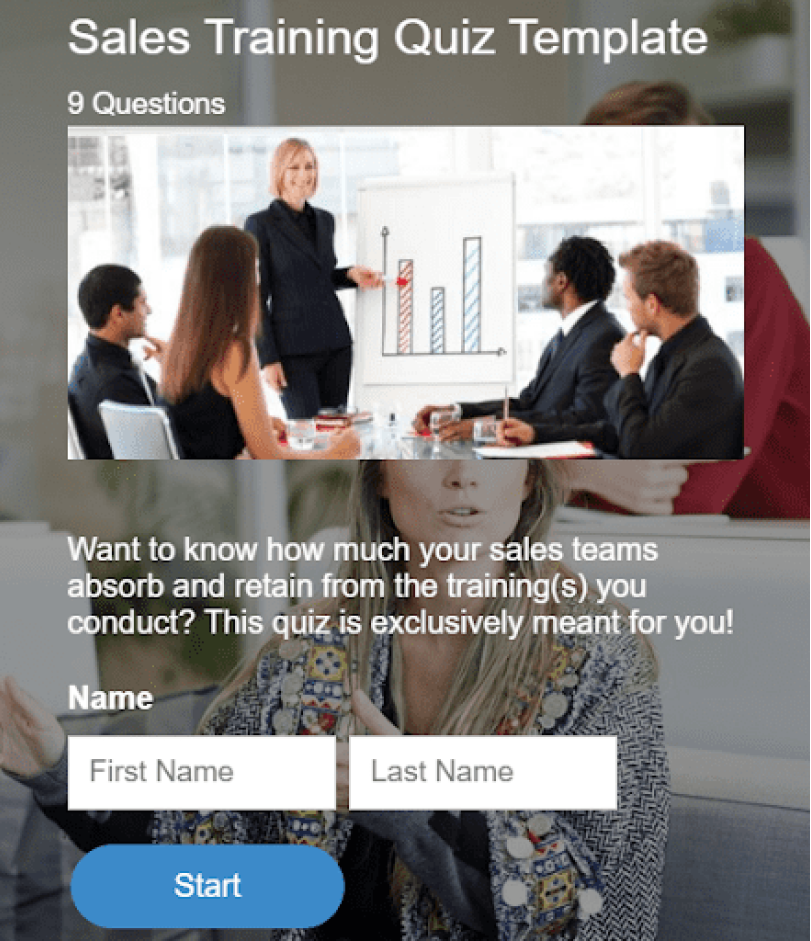
- Refresher assessments conducted periodically a while after the training boost long-term knowledge retention.
Pro Tip: Besides conducting sales training quizzes and assessments, you can also improve your training programs by employing an online learning management system.
For example, you can use ProProfs Training Maker to deliver impactful sales training featuring assessments, videos, presentations, surveys, real-life examples, and more by customizing ready-to-use sales training courses or building courses from scratch.
4) Improve Sales Management
Sales managers are responsible for several crucial sales functions, including setting revenue targets, mentoring salespeople, and managing sales teams and processes. Online sales assessments let you improve your sales management by enhancing your hiring, training, and succession planning processes.
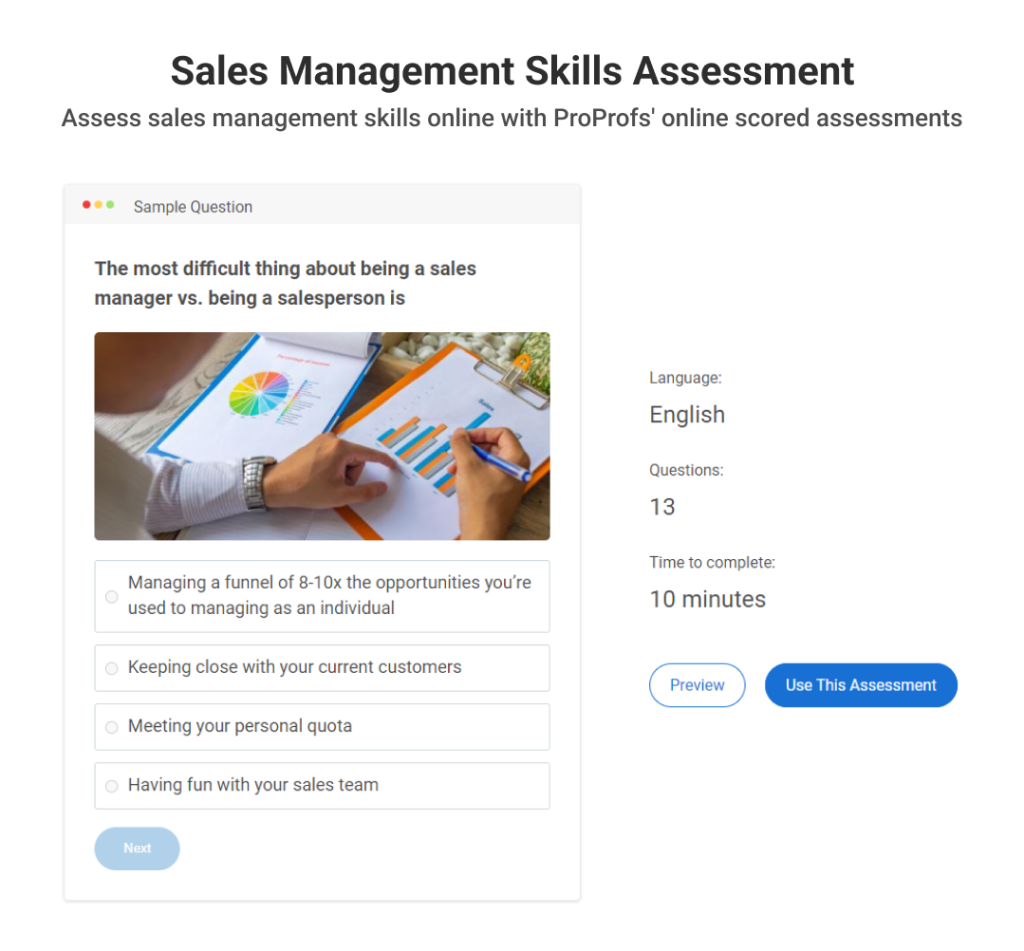
5) Easily Hire & Train Remotely
Online hiring assessment tools enable you to hire from anywhere in the world and easily conduct training assessments for globally dispersed sales teams. This lets you establish highly effective remote hiring and training processes.
Pro Tip: For your hiring process, you can even conduct remote interviews using a sales assessment tool. All you need to do is create a video interview assessment that candidates can take any time, anywhere.
Watch: How to Create a Video Interview Question
6) Reduce Salesperson Turnover
Research indicates that salespeople who receive good support from their managers and organizations show lower intentions of leaving their jobs. Sales assessments help you provide this support to your sales staff through impactful leadership and effective training and development programs.
Assessments also reduce turnover by ensuring you hire people who will fit in your work culture and helping you align employees with the right roles according to their skills and personality.
7) Save Time & Money
Sales assessments streamline your hiring and training processes, help avoid bad hiring, reduce turnover, and minimize wasted training. All of this saves a lot of time and money you can invest in growing your business.
8) Increase Sales
Improving your sales teams and leadership using assessments will help you improve your sales numbers through more effective selling. Plus, it can also pay major dividends in time since a better sales staff will help you enhance your sales processes and innovate with new sales techniques.
Those were all the benefits of conducting online sales tests. As you can see, skill and personality testing are vital for building a killer sales workforce and achieving your sales goals.
However, sales assessments are only impactful if you know what to assess. Scroll on to the next section to know what skills and personality traits you must focus on in your sales tests.
FREE. All Features. FOREVER!
Try our Forever FREE account with all premium features!
What Are the Best Sales Assessment Tools?
Choosing suitable sales assessment tools is crucial for accurately measuring the skills and potential of candidates for sales roles. Here’s a look at some of the top sales assessment tools available today, along with their strengths and weaknesses:
1. ProProfs Quiz Maker
ProProfs Quiz Maker is a user-friendly online tool for creating and administering sales assessments quickly. Its AI quiz generator instantly creates tests tailored to industry, role, level, and topic, with customizable difficulty, duration, and scoring.
You can choose from over 100,000 ready-made quizzes or build your own using 15+ question types, including multiple-choice, fill-in-the-blanks, and audio/video responses.
Pros:
- Over 100 security settings, including proctoring and anti-cheating features.
- Comprehensive reports and analytics to track performance and progress.
- Automated grading for instant results and feedback.
- Custom branding options to personalize assessments with your company’s logo and colors.
- Integration of multimedia elements, such as images, videos, and audio, into quizzes.
Cons:
- No downloadable or on-premise version
- Dark user interface option is not available
Pricing:
Forever FREE for short quizzes and all essential features. Paid starts at $19.99/month.
2. iMocha
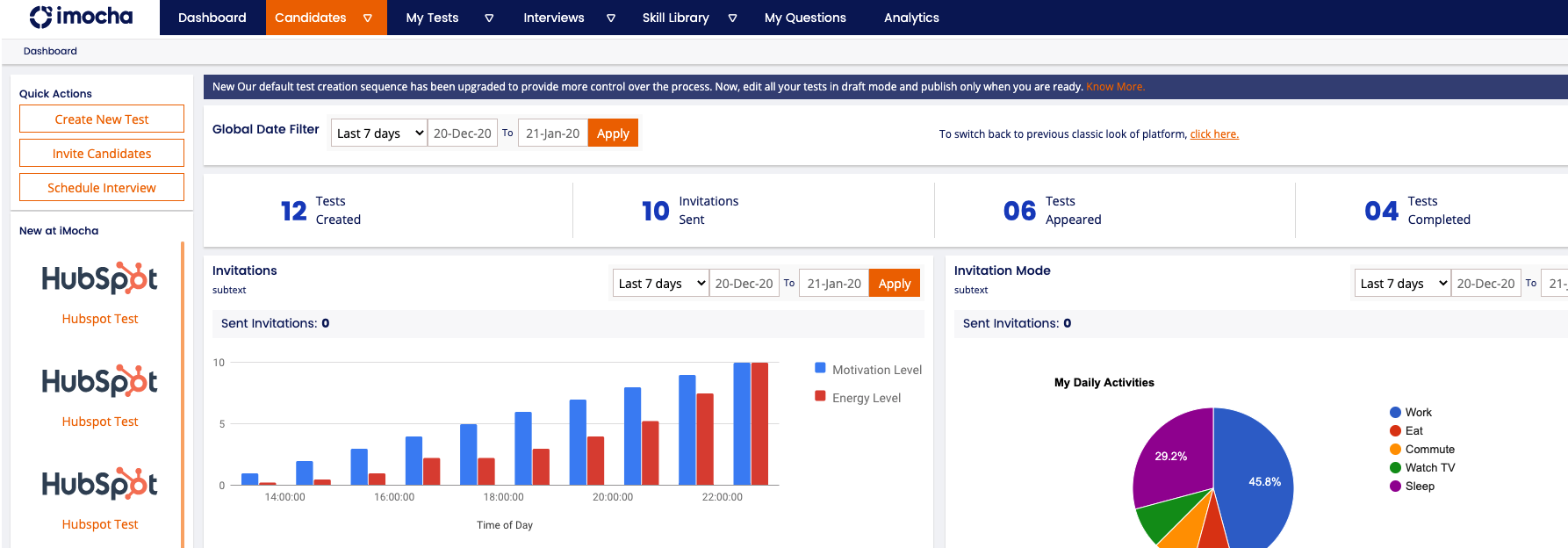
iMocha is a robust platform that simplifies hiring with reliable pre-employment tests. I created sales quizzes and was impressed by features that assess competencies like sales aptitude, negotiation, and communication.
You can also benchmark candidates against industry standards. The platform offers a library of 2,000+ pre-built assessments, including personality, cognitive, and aptitude tests.
Pros:
- Seamless integration with Applicant Tracking Systems (ATS) and Human Resource Management Systems (HRMS).
- Robust security features, including proctoring and anti-plagiarism tools, ensure test integrity.
- Available in multiple languages, making it suitable for global teams.
- Includes advanced simulations and case studies to enhance the testing experience.
- Provides a dedicated manager to assist with implementing and managing assessments.
Cons:
- Some pre-built tests may need to be updated or directly relevant to specific sales roles.
- Access to advanced features like video interviews and custom branding requires higher-tier plans.
Pricing:
Starts at $50/user/year.
3. TestDome
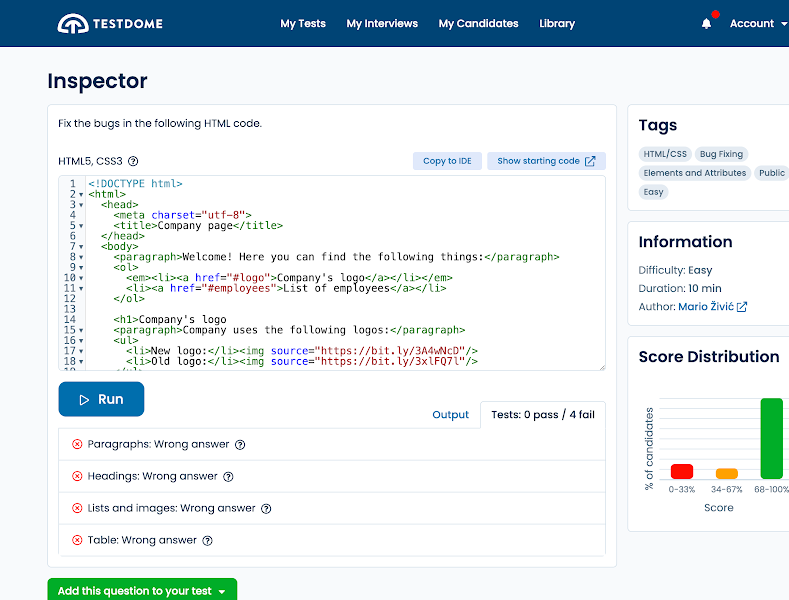
TestDome is a top sales assessment platform that measures sales competency specific to job roles. It allows you to evaluate your team across areas like sales strategy, management, operations, and analytics. You can also create custom tests tailored to your job descriptions.
I appreciate its detailed reporting and analytics, including performance metrics and benchmarking. Additionally, it offers pre-built templates that save time when launching tests.
Pros:
- Allows easy candidate invitations via email, link, or QR code.
- Integrates smoothly with ATS and HRMS systems for a streamlined hiring process.
- Offers detailed reporting, including performance metrics and anti-cheating features.
- Supports bilingual questions and API integration for enhanced customization.
- Real-world scenario questions that assess practical problem-solving abilities.
Cons:
- Limited customization options for the provided templates.
- No ability to randomize questions, which could lead to predictability in assessments.
Pricing:
Starts at $20/candidate for five candidates
4. Mettl
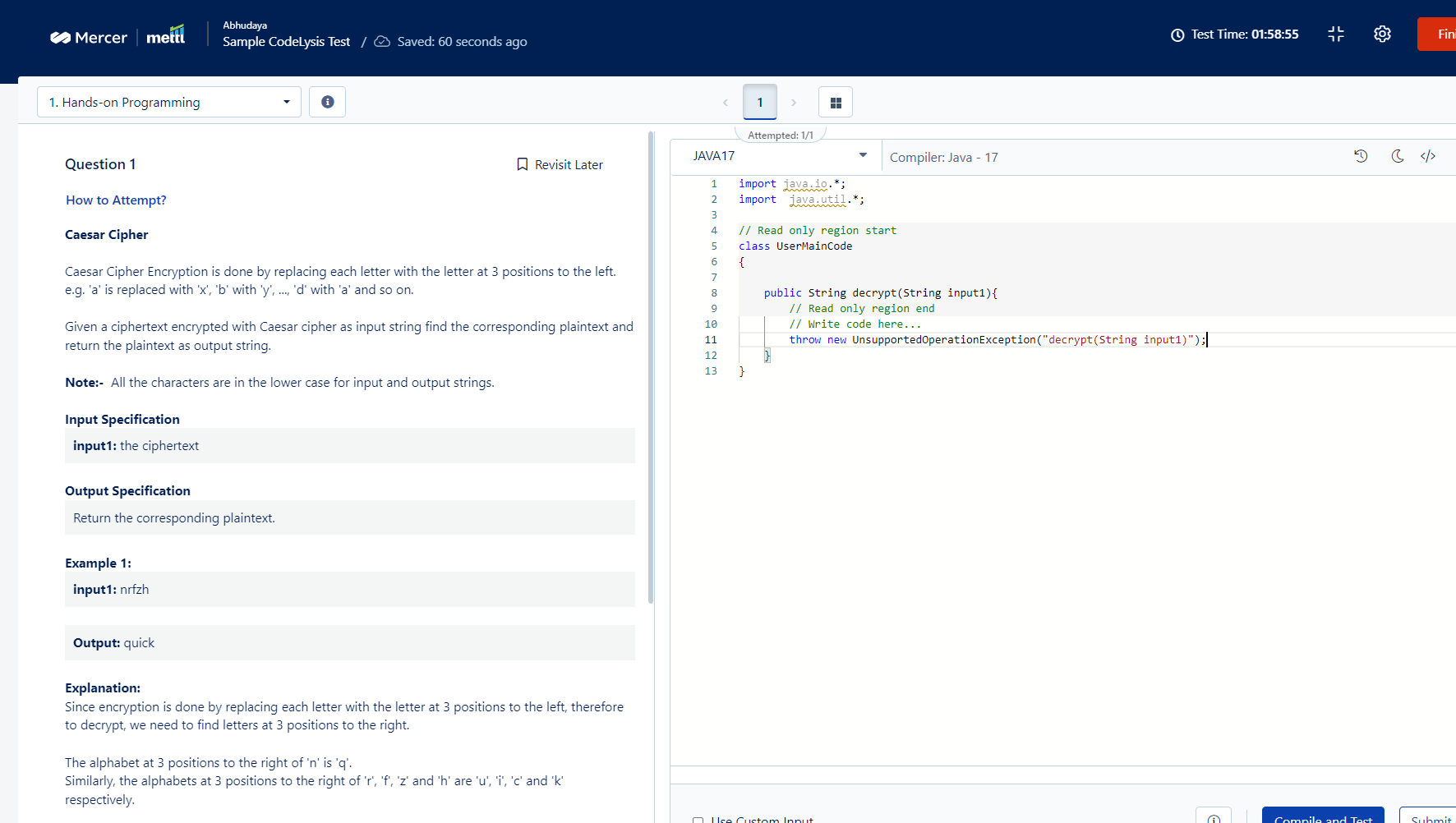
Mettl is a versatile sales assessment tool known for its seamless third-party integrations, ideal for streamlining the hiring process. It integrates effortlessly with applicant tracking systems like Greenhouse and Workday, ensuring smooth data flow. Mettl also works well with existing HR systems, reducing administrative effort.
You can create and administer customizable sales assessments tailored to specific roles and requirements.
Pros:
- Extensive test library covering cognitive, technical, behavioral, and domain-specific skills.
- Predictive analytics help forecast sales performance based on assessment data.
- High-level security with proctoring and data encryption ensures the integrity of the assessments.
- AI-driven tools for analyzing speech, verifying identities, and assessing technical skills.
- Customizable assessments tailored to specific sales roles and requirements.
Cons:
- The platform may require some learning time, even with available online training.
- The introductory pricing is only available for specific projects, which might only suit some users.
Pricing:
Custom quote
5. TestGorilla
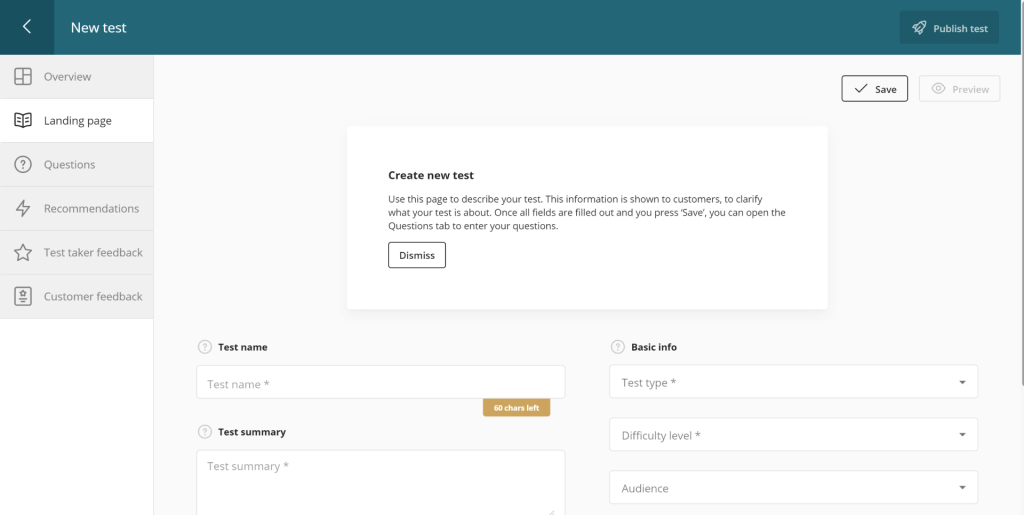
TestGorilla is popular sales assessment software optimized for mobile devices. It allows candidates to take assessments anytime, anywhere, on their preferred device. Its extensive test library covers cognitive ability, programming, software, personality, and language skills.
I appreciate the platform’s simulation questions, which mimic real job situations, and video response questions, which evaluate communication skills and personality.
Pros:
- Offers over 150 standardized tests that cover technical, behavioral, and cognitive skills.
- Allows multiple users within an organization to manage and assign tests.
- AI-powered evaluation features with text response options for more in-depth assessments.
- Robust anti-cheating mechanisms, including IP monitoring, time limits, and webcam screenshots.
- Easily integrates with various HR tools, including ATS systems like Workable, Greenhouse, and more.
Cons:
- Customization options are more limited compared to other sales assessment tools.
- May experience performance issues on older browsers or mobile devices.
Pricing:
Starts at $499/month
These sales assessment tools offer unique features that can enhance your hiring process by comprehensively evaluating candidates’ sales capabilities. Selecting the best tool depends on your specific needs and the goals of your sales assessments.
Top Competencies to Look for in Salespeople
Here are all the competencies you should assess candidates and employees on as a part of your sales hiring and training processes. We’ve divided these into hard skills, soft skills, and personality traits.
Hard Skills
- Fundamental Sales Knowledge & Skills
Any individual applying for or working in a sales role must have a solid grasp of foundational sales knowledge. For example, they must deeply understand the buyer’s journey.
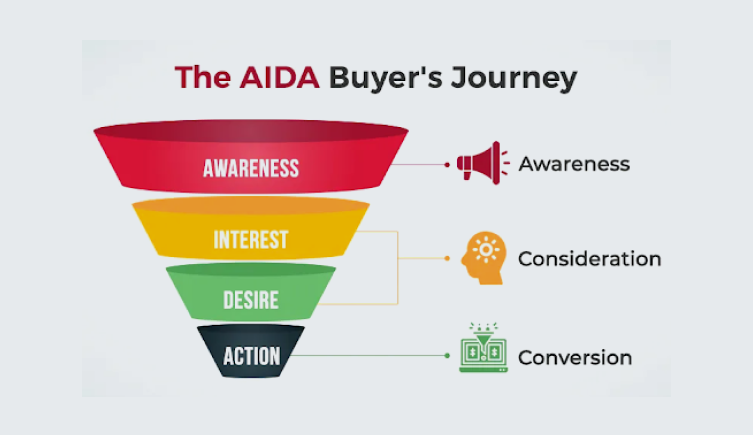
- Product Knowledge
The better a salesperson understands their product or service, the better they can market and sell it. For example, if a salesperson is selling a software tool, they may need to satisfactorily answer several questions on the tool’s functionalities on each sales call.
- Lead Prospecting
A salesperson must be able to work together with the marketing department to prospect potential customers by developing an effective prospecting sequence and making cold calls.
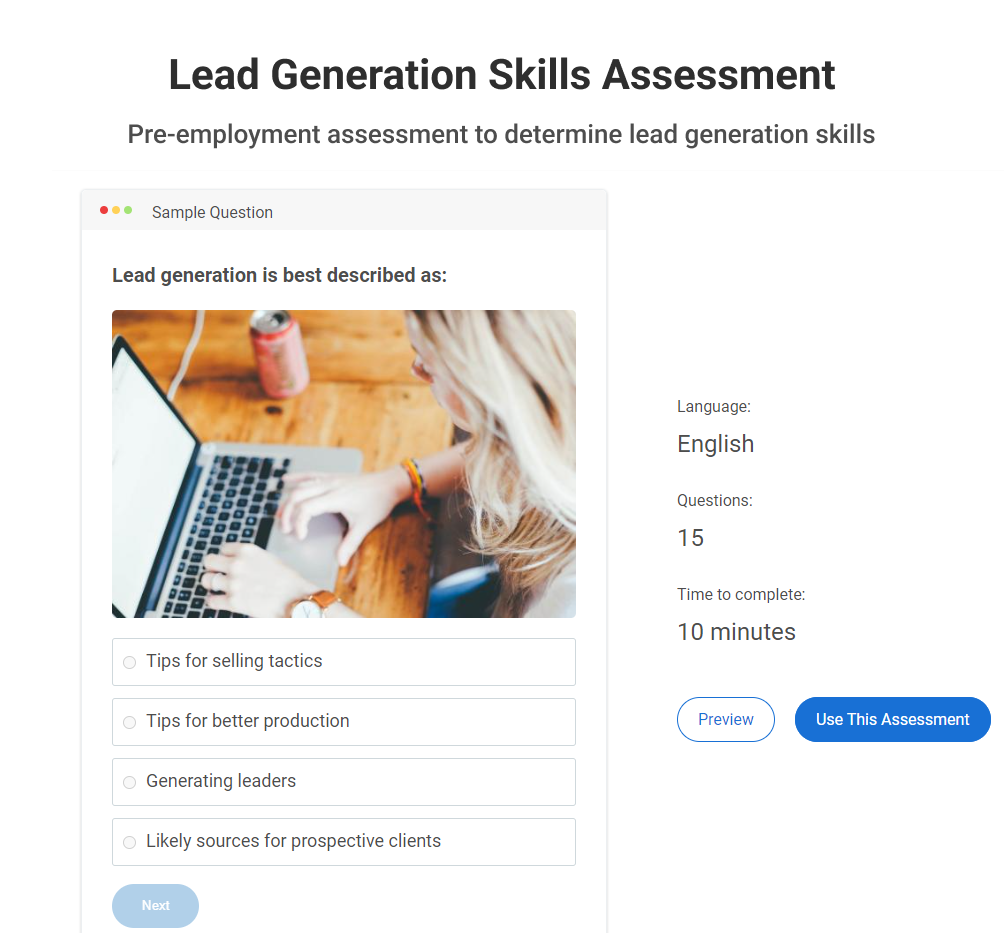
- Lead Nurturing & Sales Pitching
Salespeople must know how to qualify leads and implement effective lead nurturing strategies aligned with the buyer’s journey. They must also be skilled at making compelling sales pitches and strong presentations to convince nurtured leads to buy your offerings.
- Objection Handling & Closing
Salespeople must be adept at handling sales objections by alleviating prospects’ concerns about budget, trust, competitors, etc. Once the deal moves forward, they must be able to utilize proven sales closing techniques to seal it.
- Upselling & Cross-Selling
Did you know that Amazon once attributed over a third of its income to cross-selling? Upselling and cross-selling are key for driving revenue growth and are highly prized skills among salespeople.
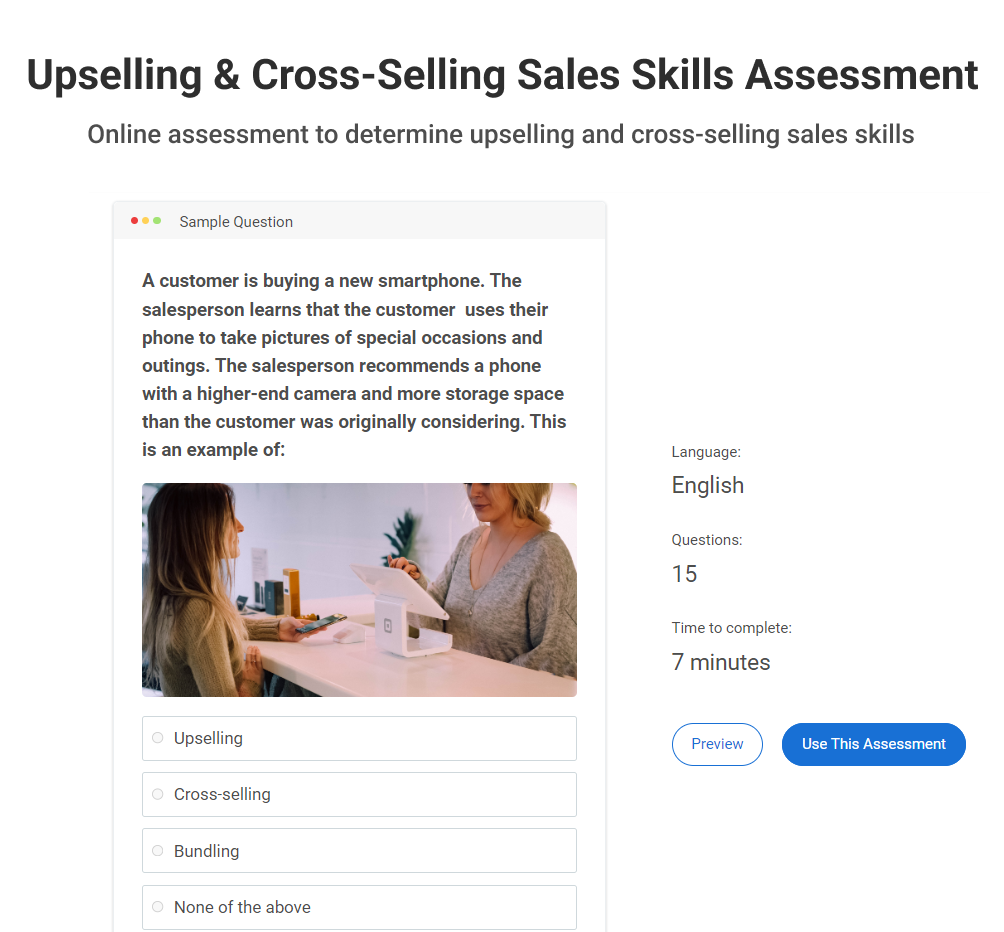
- Tech-Savviness
Salespeople need to know their way around various software for sales tasks, such as pipeline management, sales workflow automation, and analytics. For example, they may need to use customer relationship management tools, such as Salesforce or BigContacts, and data analysis tools, such as Google Analytics.
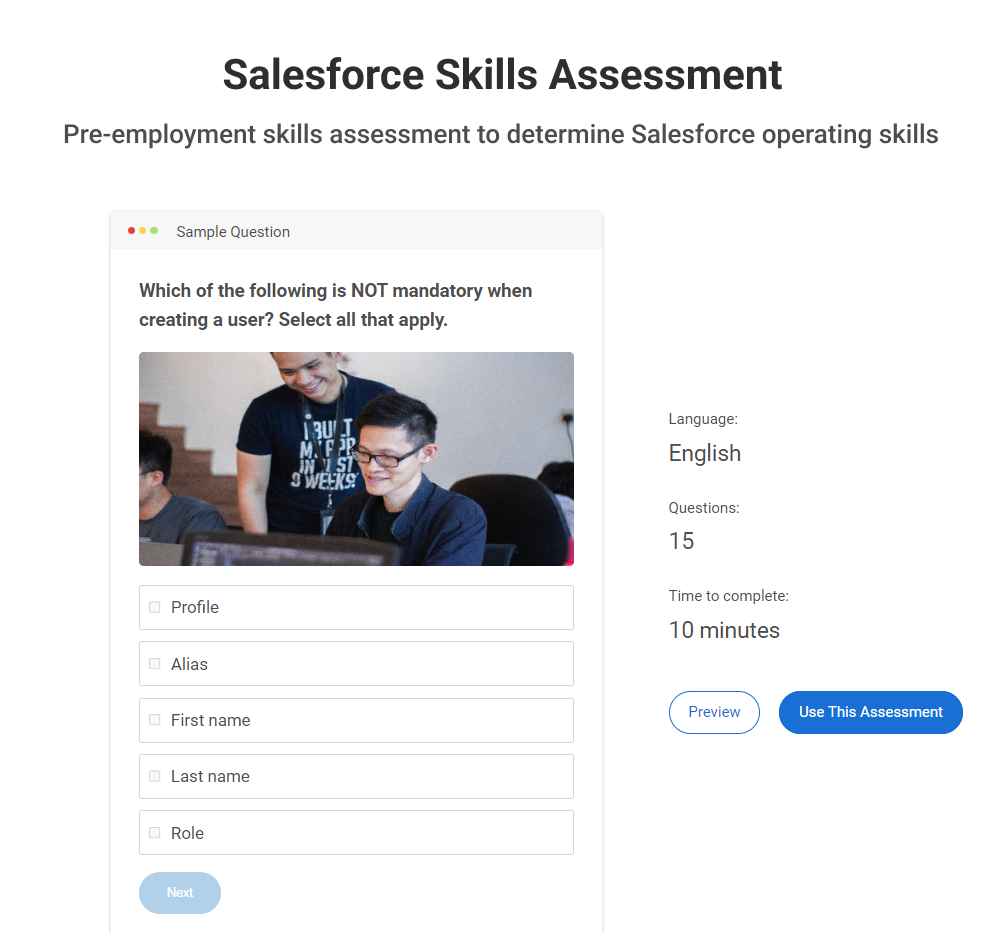
- Marketing Skills
Salespeople can refine their sales techniques by incorporating marketing methods into their skills. A marketing mindset can also help them better understand their target demographic and brainstorm more effective ways to sell.
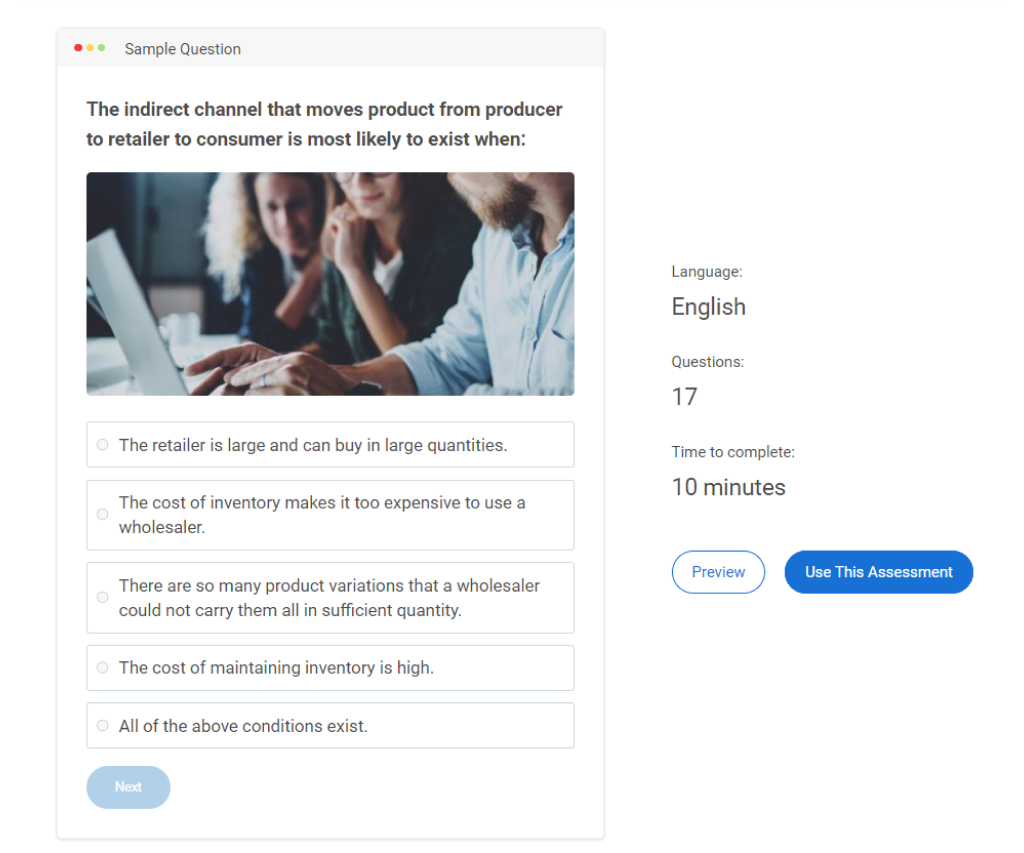
Soft Skills
- Communication
Communication skills hold massive importance in the world of sales. Salespeople need to communicate effectively with prospects, customers, and co-workers every day to make things happen.
For example, to conduct a successful sales call, salespeople must introduce themselves properly, employ active listening skills to understand prospects’ pain points and present a solid value proposition using compelling speech.
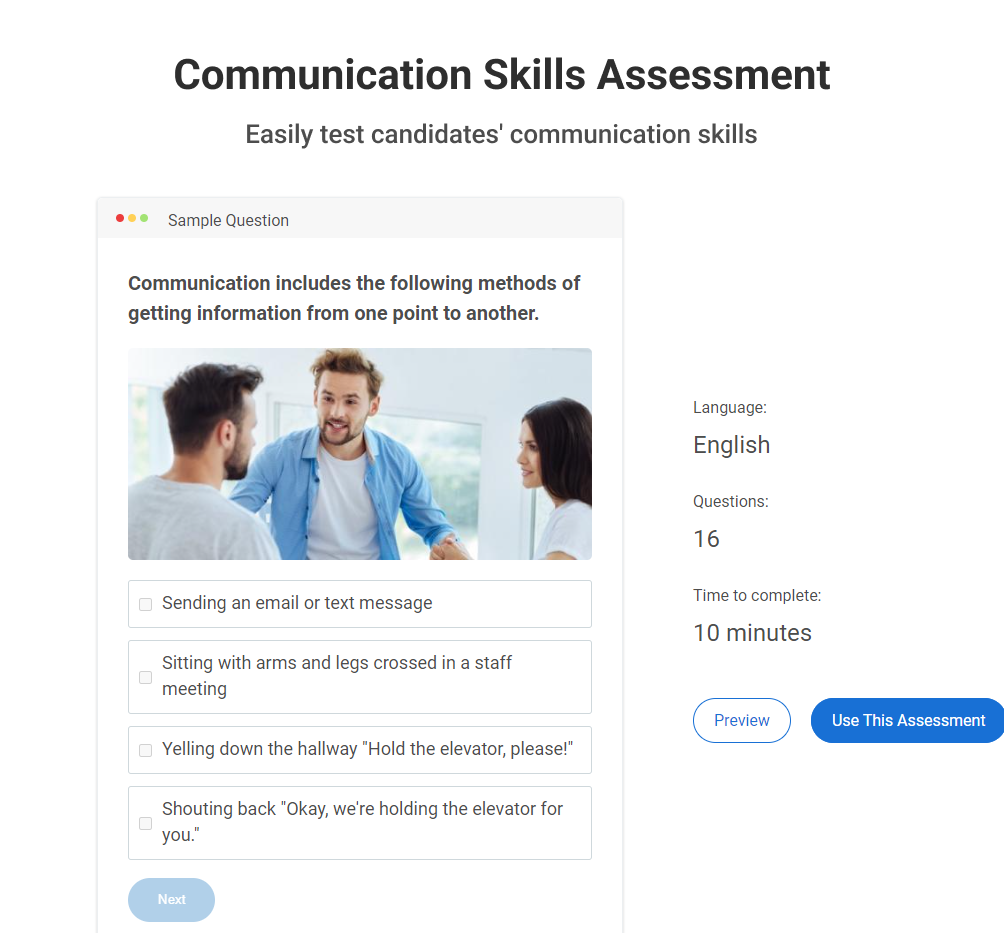
- Persuasion & Negotiation
When negotiating the price, salespeople must pull off a tricky balance between ensuring that the customer leaves happy and willing to purchase again and bringing back a deal that makes financial sense.
That takes first-rate persuasion and negotiation skills.
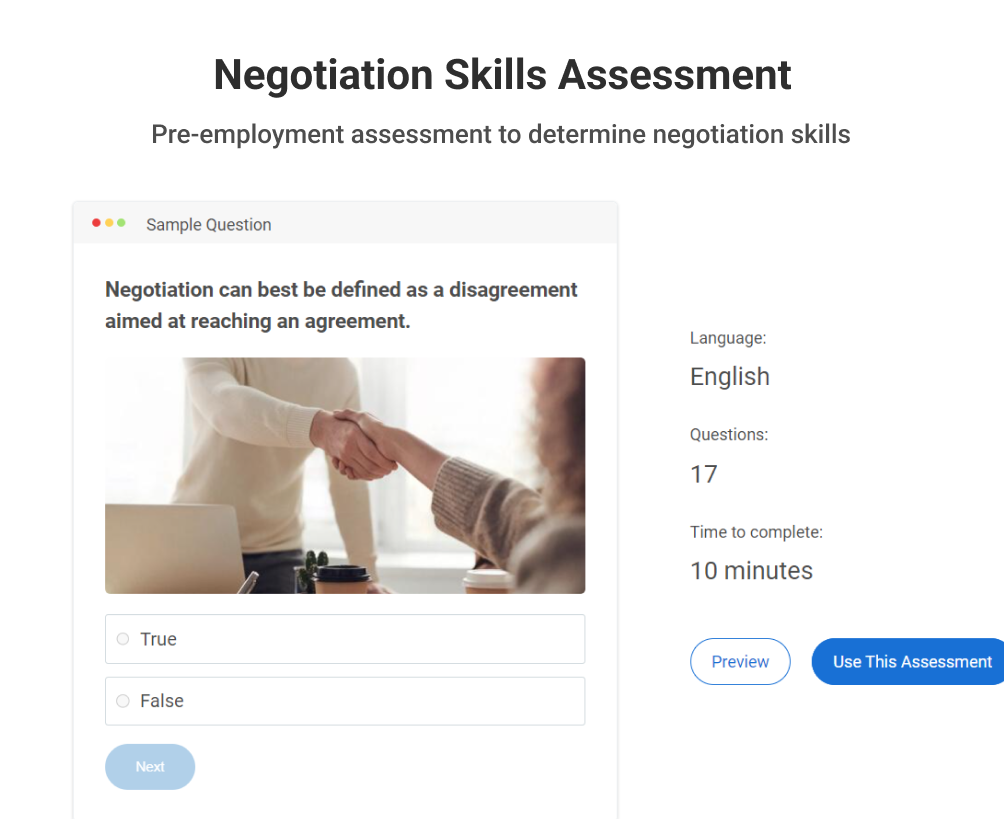
- Email Writing Skills
Salespeople with good email writing skills can prospect successfully via cold mailing and nurture leads who prefer communicating via email. To craft powerful email messages, salespeople must know about email etiquette and have good copywriting skills (another core marketing skill).
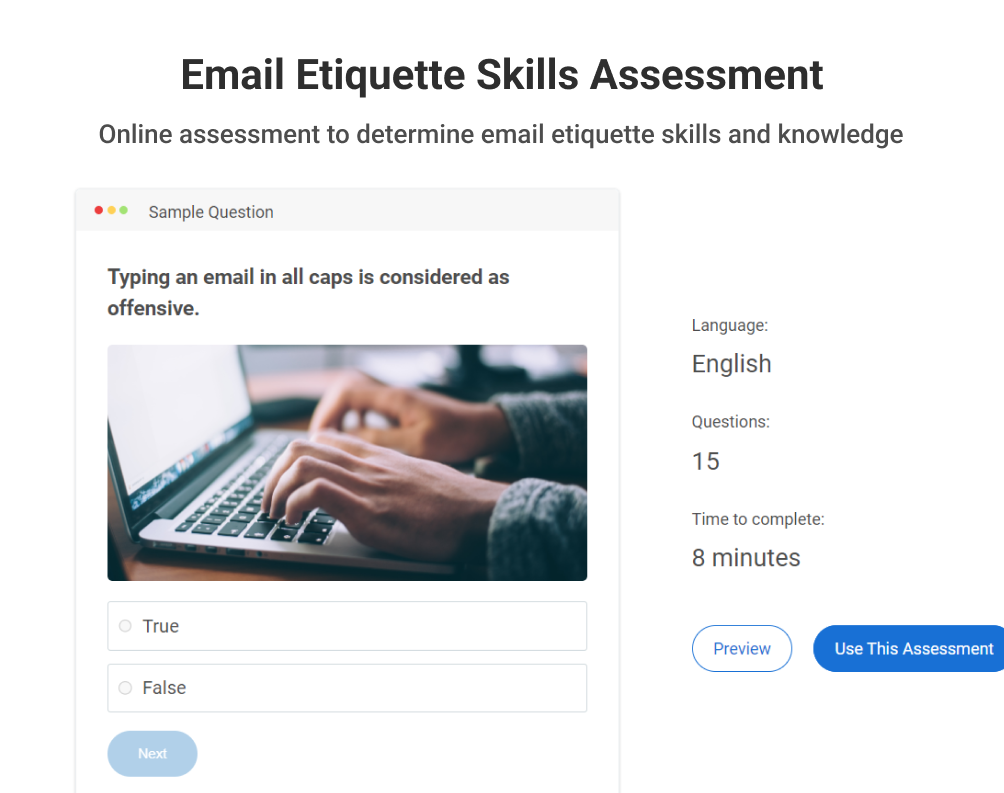
- Relationship Building Skills
The field of sales thrives on relationship building. First, salespeople must build great relationships to create loyal and high-value customers. Secondly, they must collaborate with team members and other employees to achieve their sales goals.
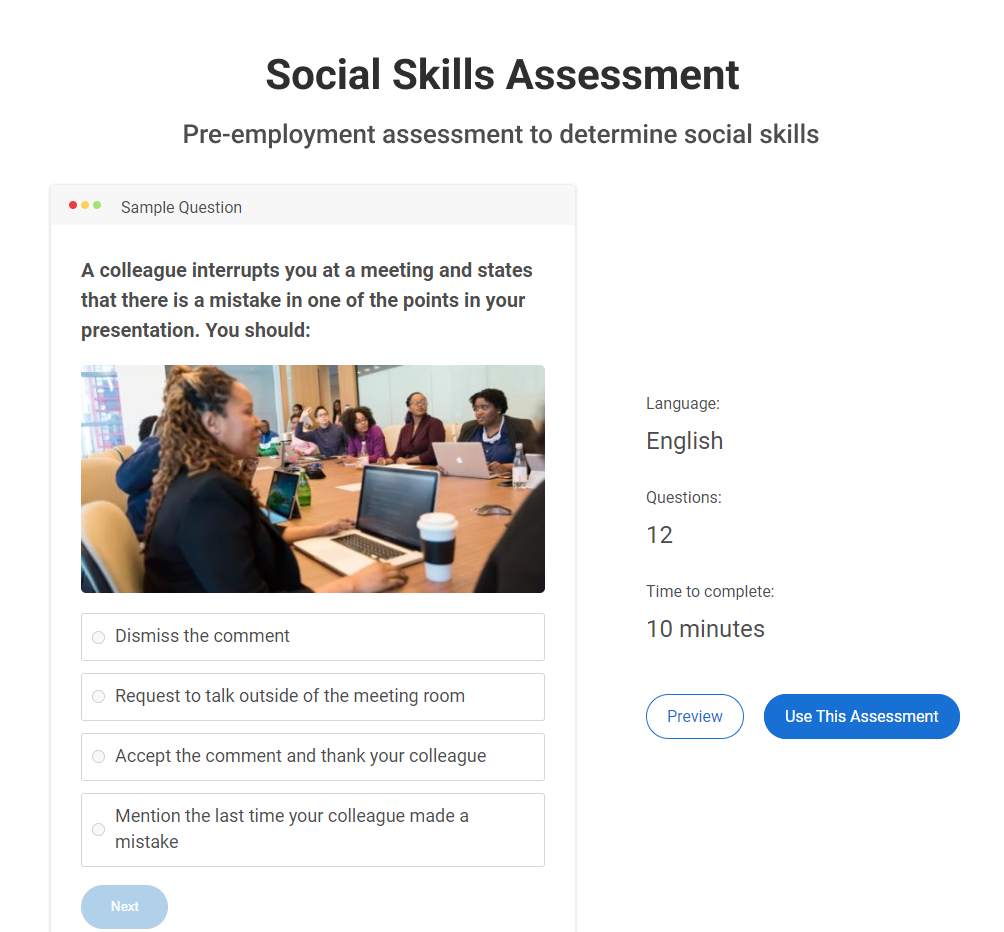
- Cognitive Abilities
Salespeople must have a sharp mind so they can come up with creative ways to handle objections, upsell and cross-sell, and close effectively. Some of the cognitive abilities you must assess using your aptitude test for sales include the following:
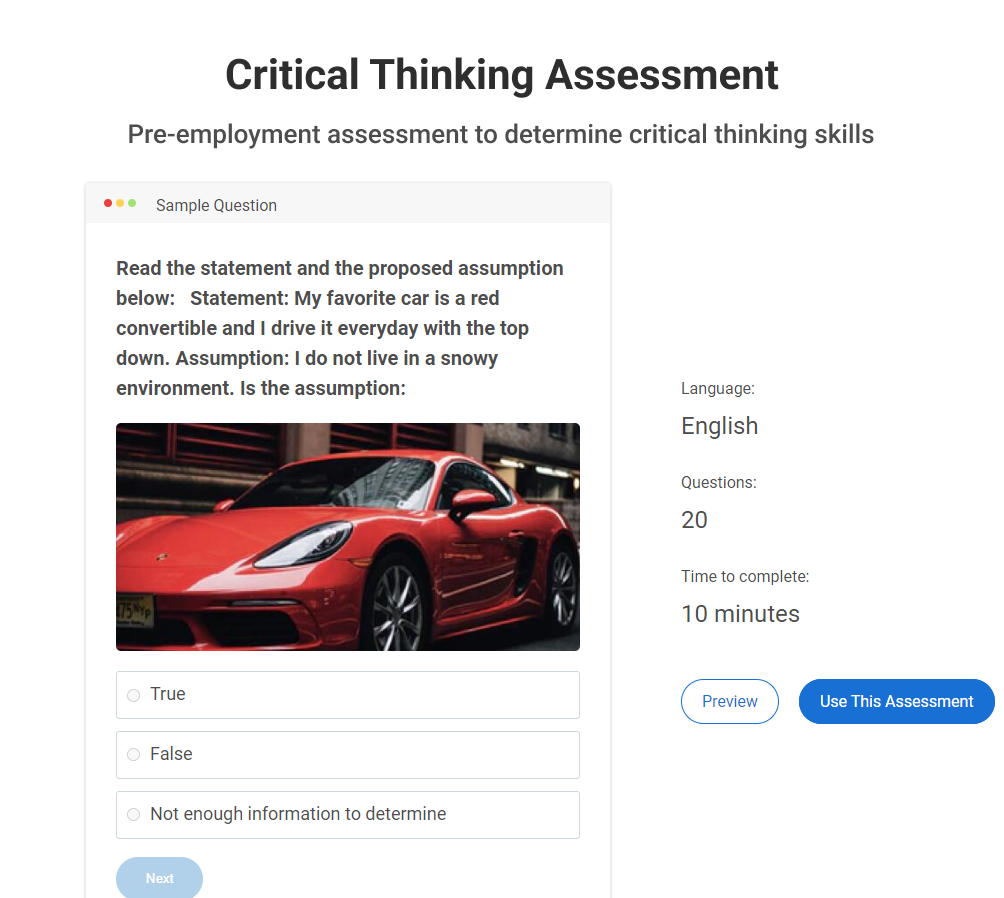
- Time & Task Management
A salesperson must perform various daily activities and prioritize critical tasks, meaning they must be great at managing time, tasks, and stress.
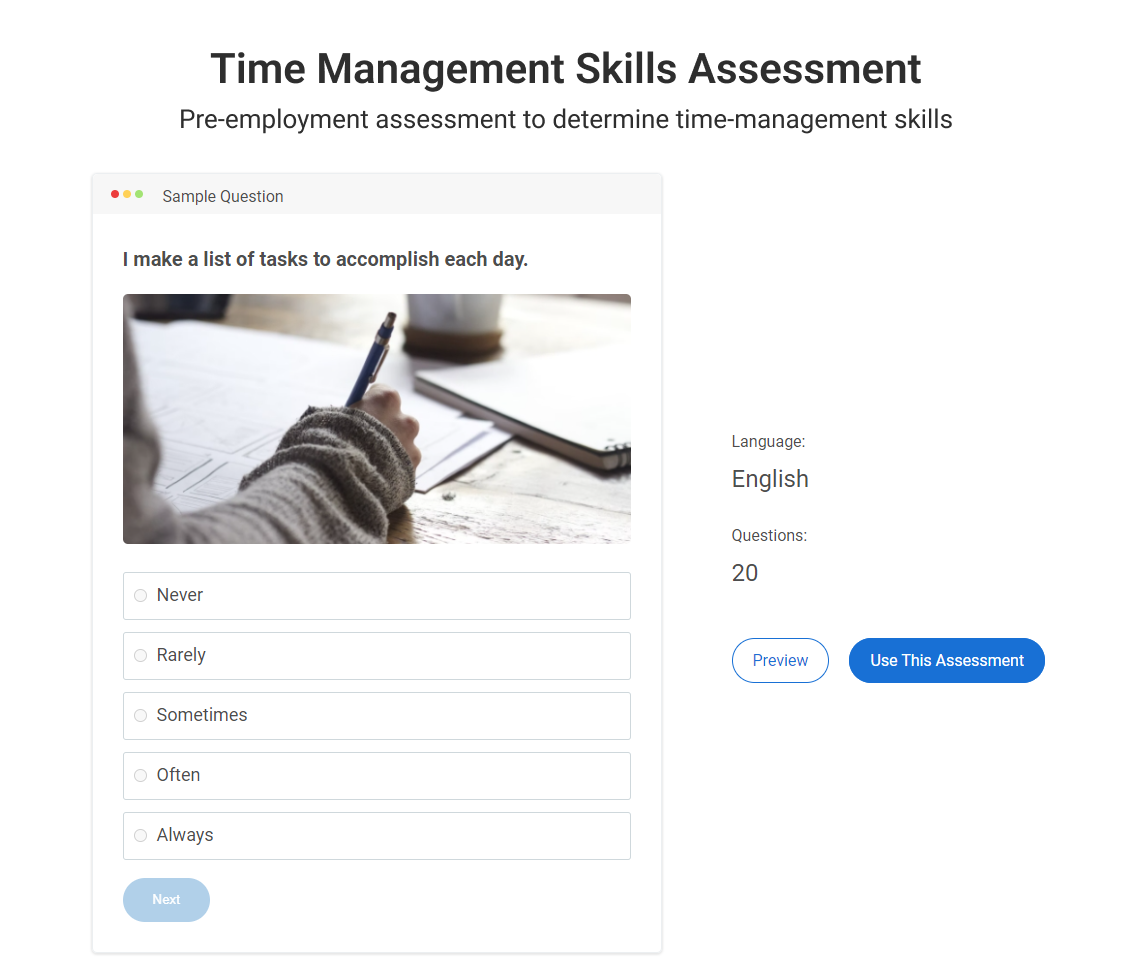
- Change Management
Your sales staff must be comfortable navigating and managing organizational change to ensure unhindered productivity and steady sales growth. While important for all salespeople, change management is a crucial skill, specifically for sales managers since they’re assigned the responsibility for implementing such changes in their team.
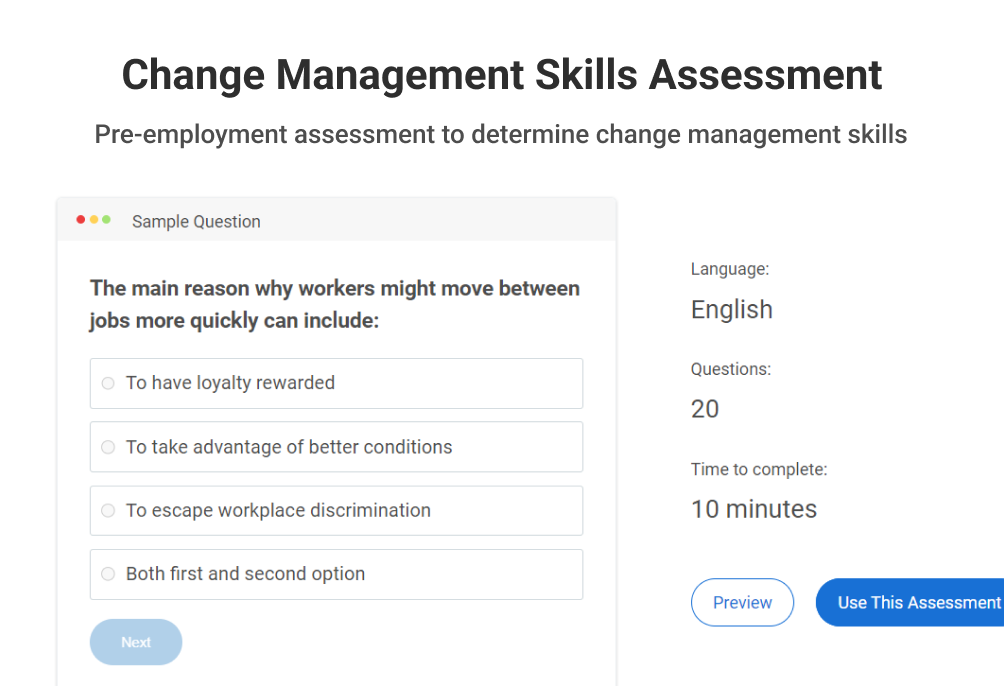
- Storytelling Ability
Salespeople who can tell engaging stories that prospects can resonate with can deliver impactful sales presentations that your prospects can relate to, improving the chances of conversion.
Personality Traits
- Positive & Friendly Attitude
Since salespeople need to engage with prospects and form lasting relationships with customers, they must be likable and exhibit a strongly positive and extroverted attitude. Such an attitude also helps build trust and improve teamwork & collaboration.
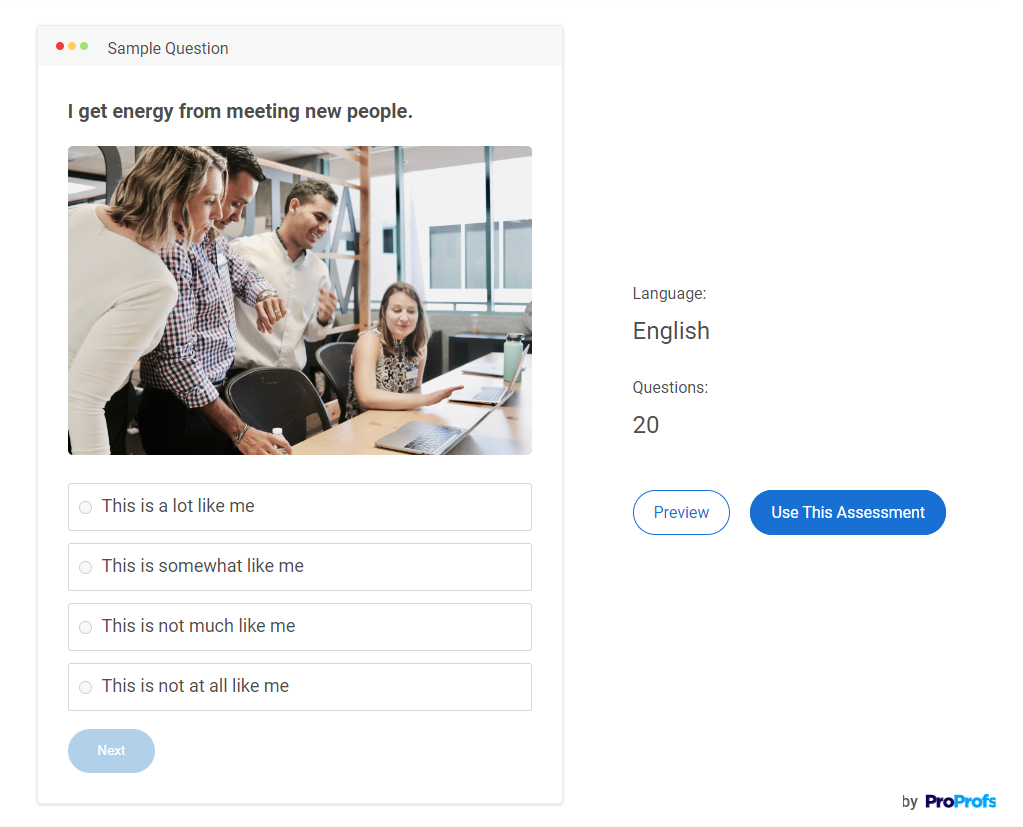
- Confidence
Salespeople must be confident in all communication with prospects and customers. That’s because confidence helps build trust, a key driver for boosting conversions and customer loyalty.
- Self-Motivation & Ambition
Self-motivated and ambitious salespeople can maintain the high levels of productivity, confidence, and goal-orientedness needed to meet or exceed sales targets while maintaining a work-life balance.
- Coachability
To remain competitive in the sales world, you must regularly come up with fresh ways of doing things, meaning that your sales staff must be trainable and open to new ideas. A coachable sales staff will enable you to implement your new methods efficiently.
- Empathy & Emotional Intelligence
Successful salespeople have a customer-centric approach to selling. They use empathy and emotional intelligence to understand their customer’s needs and keep those needs in front of their mind throughout the sales process instead of just blindly following a sales pitch.
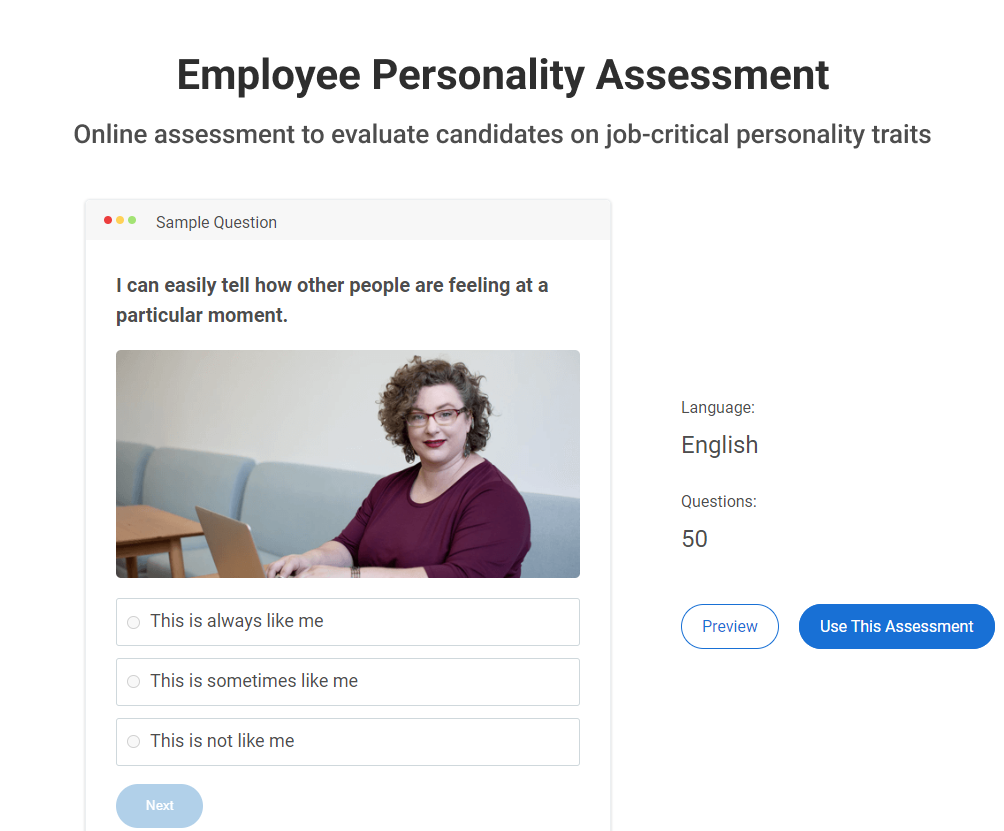
So, that was a list of all the skills and personality traits you must assess in your sales assessments. Now let’s dive into how you can create an online assessment test for sales hiring or training.
How to Create an Online Sales Assessment Test
Here’s the process for creating a salesperson test using an online test maker in five quick steps. I’ve used ProProfs Quiz Maker as an example.
Step 1: Choose a readymade assessment or start creating one from scratch
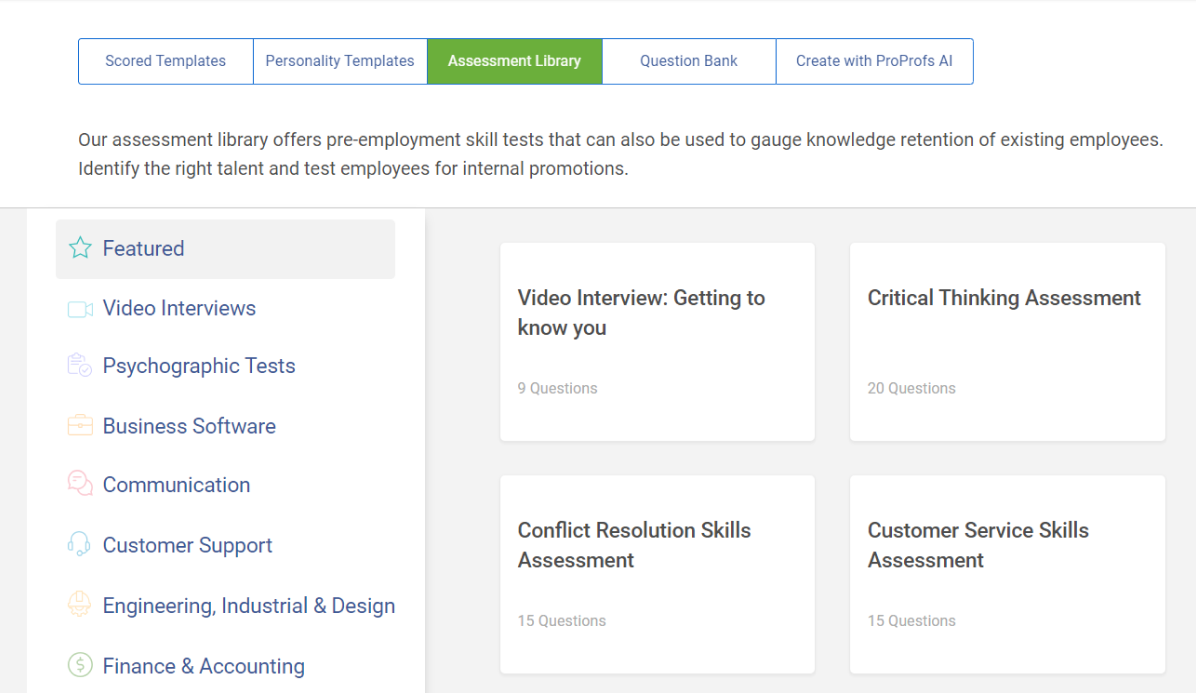
Step 2: Create your questions, import them from a question library, or generate quizzes from text or docs using AI.
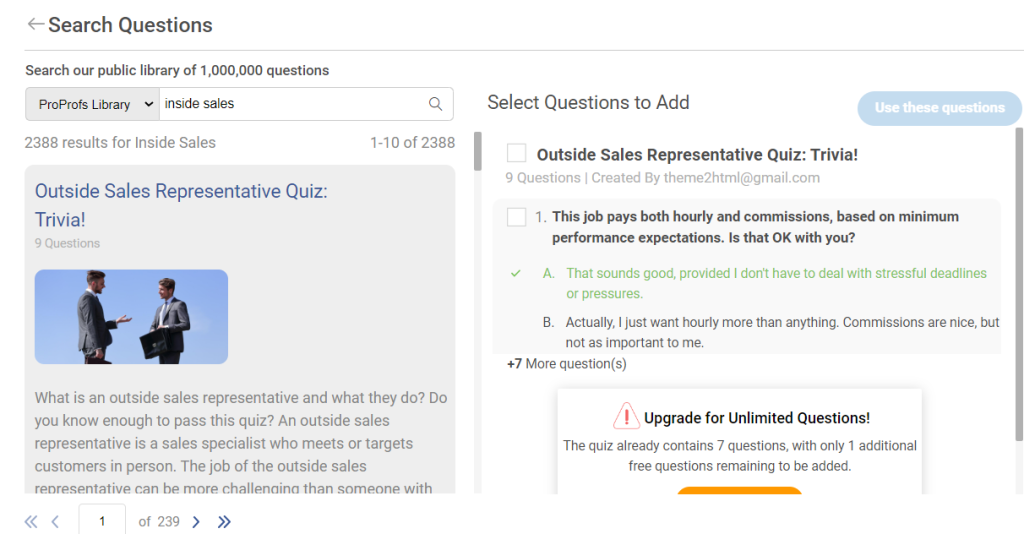
Step 3: Automate scoring (for scored tests) or map personalities to choices (for personality tests)
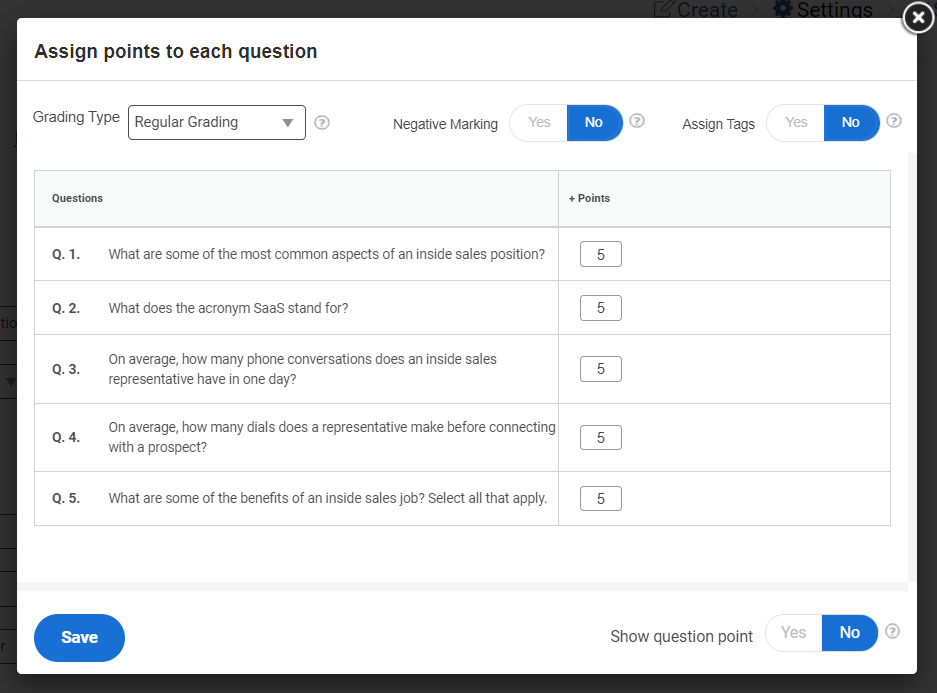

Step 4: Configure settings for security, customization, notifications, and more
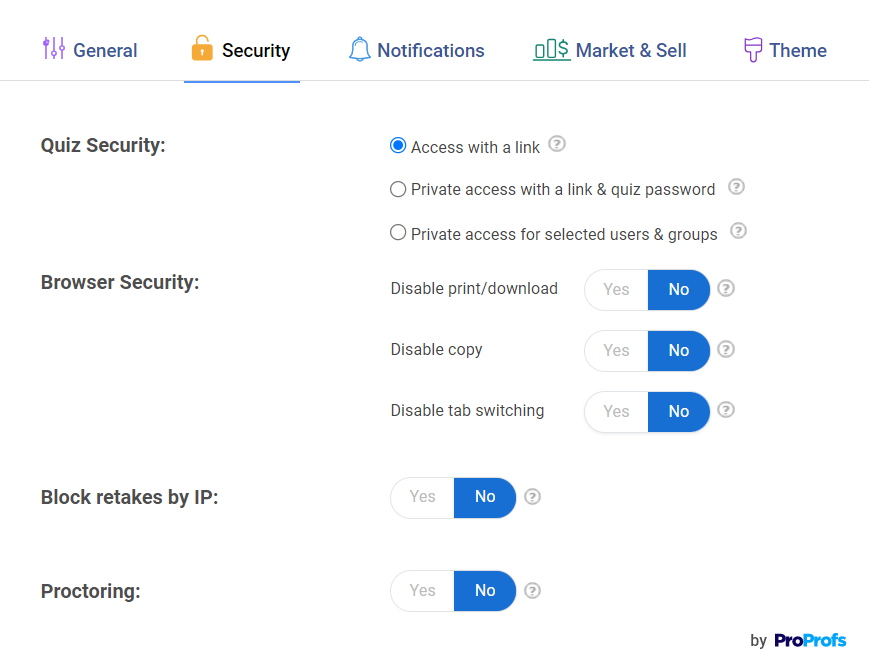
Step 5: Decide on the look & feel of your sales assessment
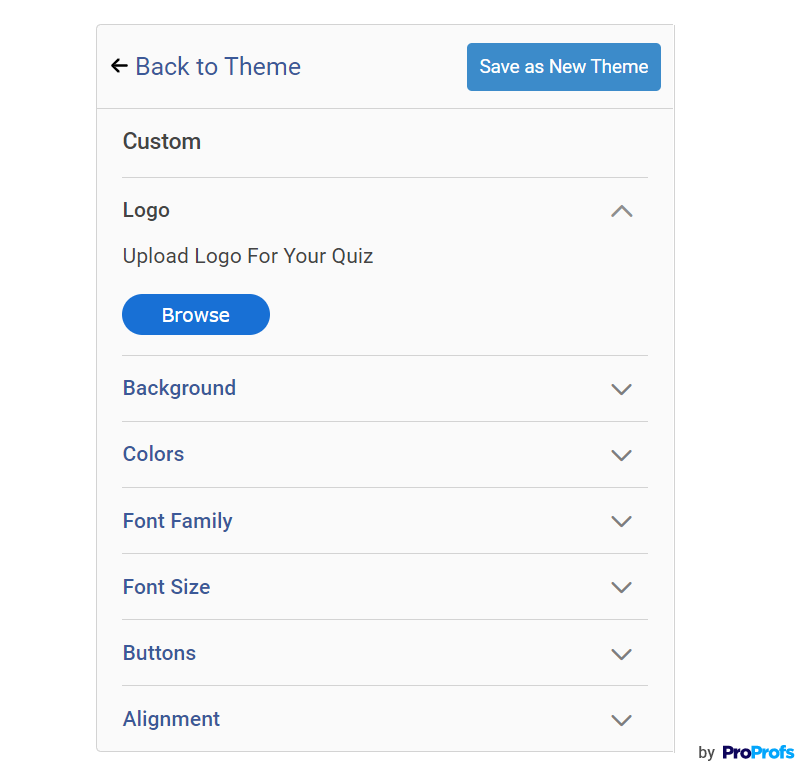
Step 6: Save the test & share it

Next, you can press the Send button and share it –

ProProfs gives the option to mail the quiz, embed it, share it on social media, or generate a QR code through which quiz takers can easily access it.
As you saw, creating an assessment is super easy with ProProfs quiz maker. It also provides various ways to share the quiz so that you reach a larger audience.
Best Practices for Conducting an Online Sales Assessment
These proven methods can help you create the best assessment tests for hiring and training sales roles.
1) Be Clear About Your Requirements
To create an online sales test that perfectly suits your requirements, you must first gain clarity on what you want to achieve. This means understanding your product, sales process, and customer personas. For this, you can ask yourself questions such as:
- How complex is the product or service we’re selling?
- How are most of our sales happening – via phone, in person, or online?
- Are we targeting first-time buyers or repeat customers?
- How complex is our sales process?
- What is my ideal customer profile?
2) Create Different Skill Tests for Different Roles
For your recruitment tests, you can create a single test to assess all sales skills or create different tests for each of the key competencies you require in your candidates. If you decide to create a single test, make sure you at least create a different test for different sales roles.
For example, here are some pre-built sales assessments that target a particular sales role:
- Corporate Sales
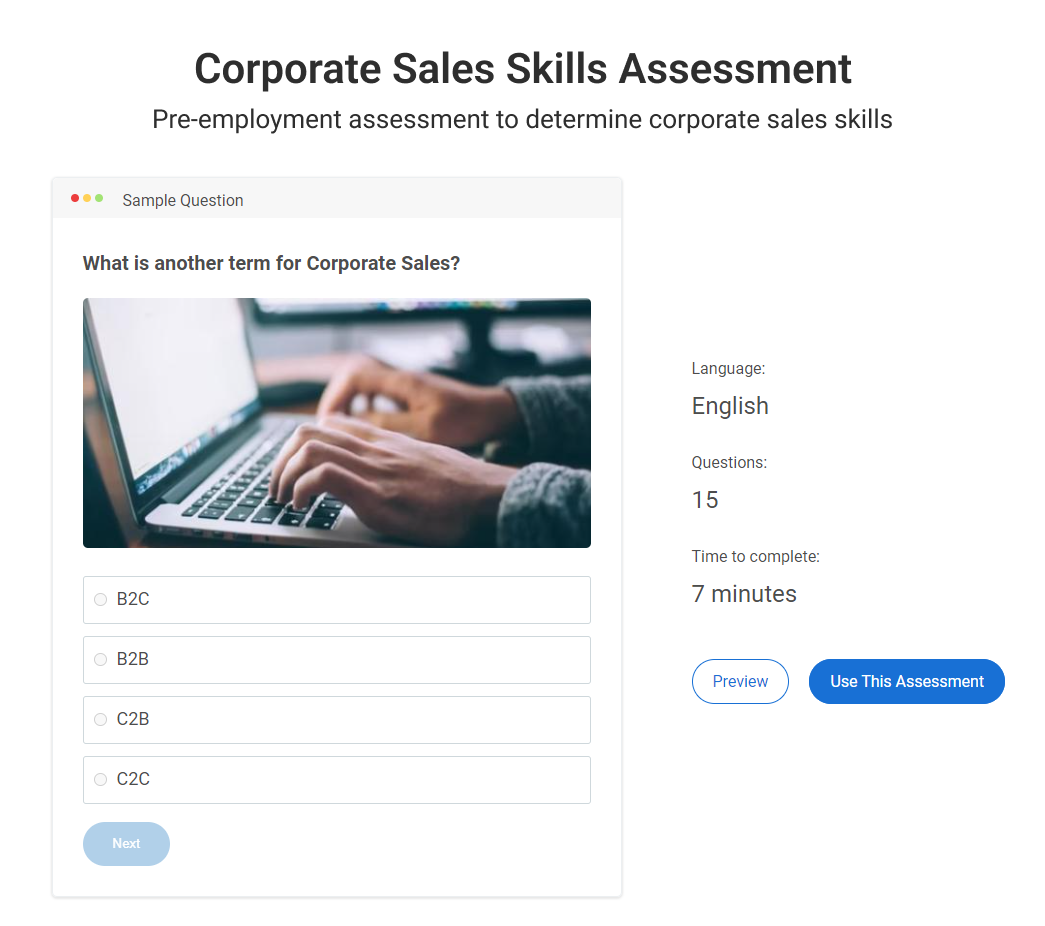
- Inside Sales
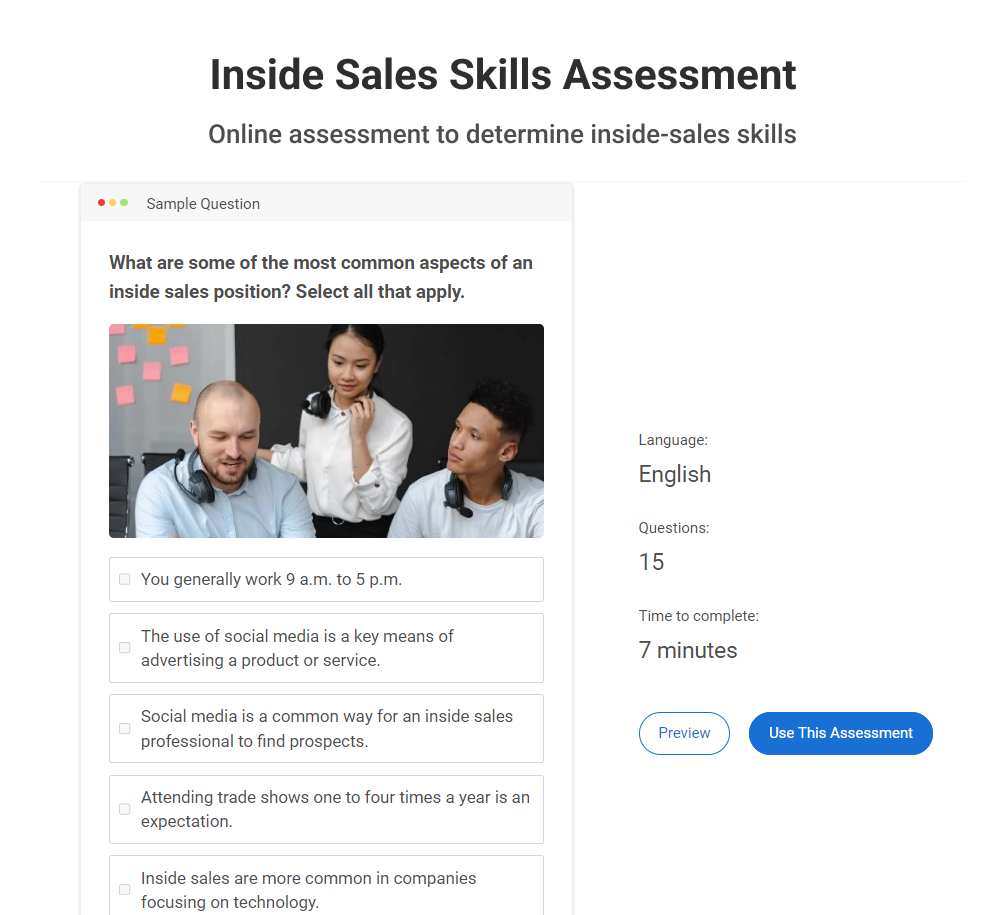
- Field Sales
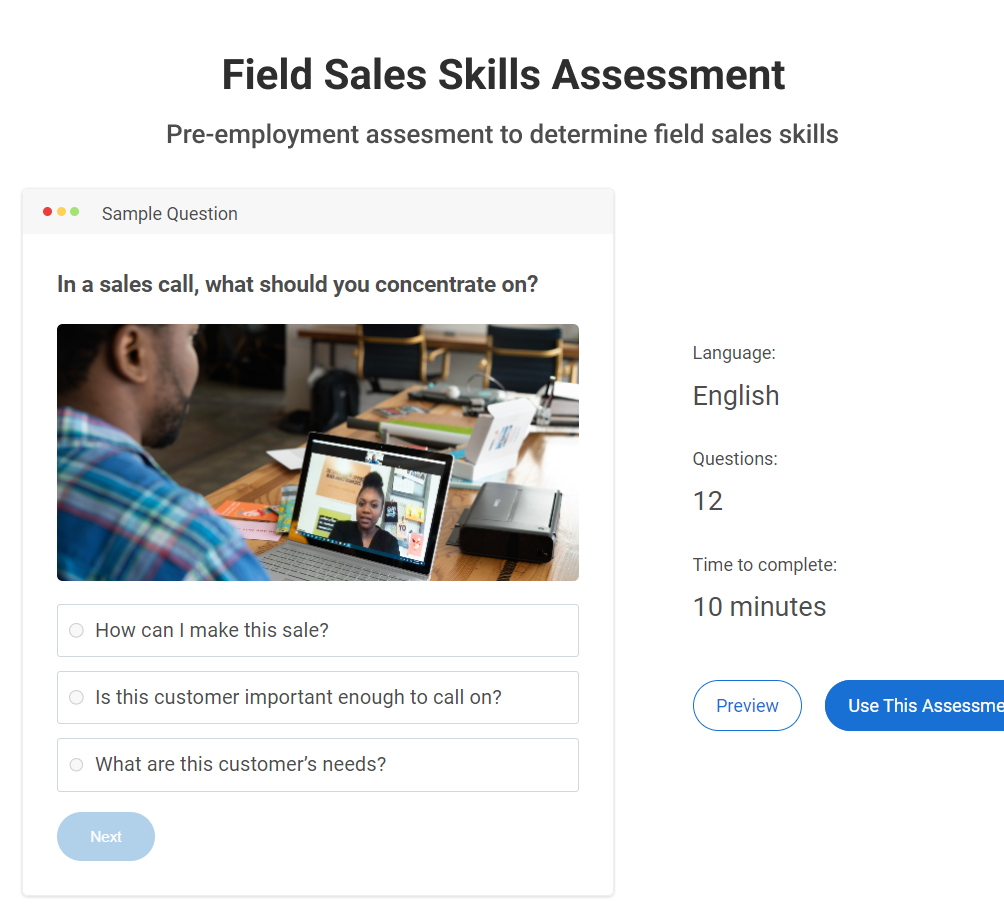
- Retail Sales
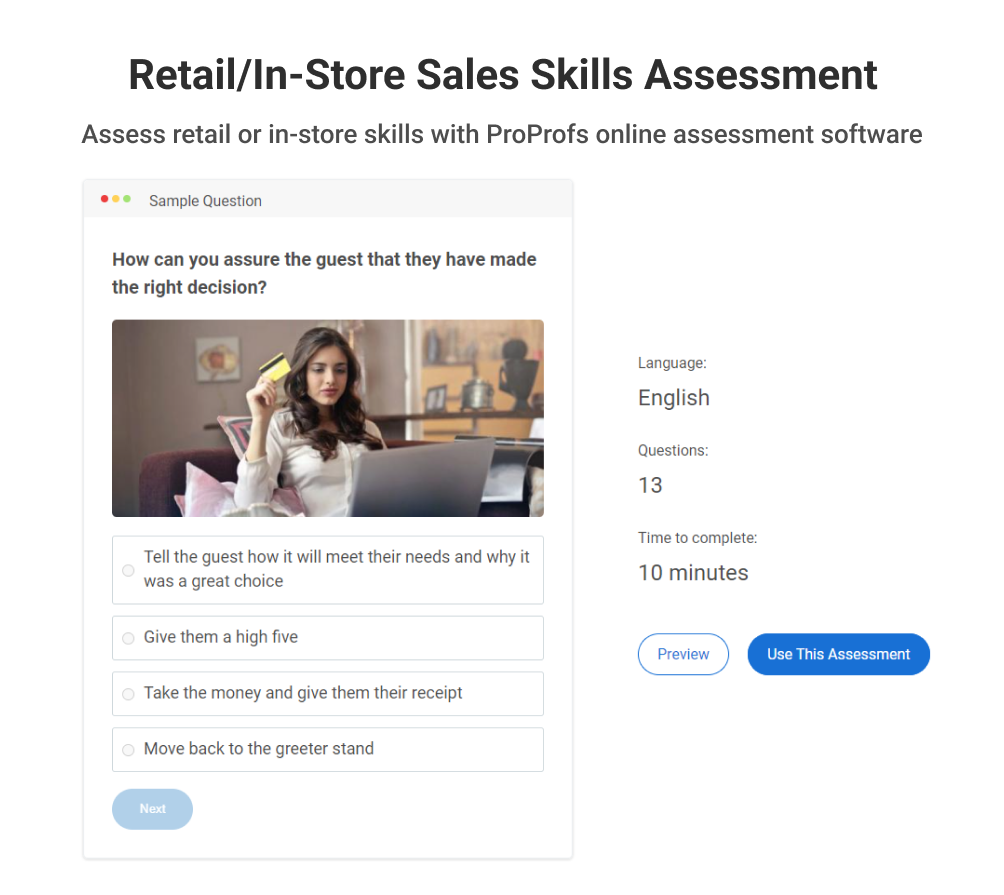
3) Use Different Question Types
Including various question types in your sales assessment makes it more engaging and insightful. This will enable you to provide a better candidate experience with your recruitment assessments and make sales training more effective with your training quizzes and tests.
You can include various closed-ended question types, such as multiple-choice, checkbox, fill-in-the-blanks, matching, etc., and open-ended question formats, such as essay and audio/video response.
Watch: 15+ Question Types for Online Learning & Assessment
4) Ask Situational Questions
Salespeople need sound judgment to handle tricky situations and capitalize on opportunities. Situational questions let you easily assess judgment and practical knowledge. Plus, they’re interesting to answer.
In a situational question, you present the assessment taker with a scenario and ask questions based on it. You may create a different scenario for each question or ask multiple questions on a single scenario using a comprehension-type question. Check out this quiz that tests sales judgment using scenario-based questions.

5) Add Images and Other Media
Besides using a mix of question types in your assessment, you can also make it more engaging by adding media to enhance its visual element. Here are the various ways you can use media in your sales assessment tests:
- Add images to the question statement
- Add images to answer options or create image-only answer options
- Add a video to the test and ask questions based on it
Watch: How to Create a Video Quiz
6) Ask Audio/Video-Response Questions
Audio/video response questions are a fantastic way to ask open-ended questions that benefit both the test taker and the evaluator. The test taker can answer essay questions conveniently while the evaluator can thoroughly assess the test taker’s personality and communication skills in addition to their knowledge.
What’s more, video-response questions are also an excellent alternative to video conferencing for conducting remote interviews. You can use video-response assessments to assess candidates from any time zone without any scheduling difficulties.

7) Configure Security & Proctoring Settings
To ensure the integrity of your sales assessments, you must configure certain security settings before deploying them. Here they are:
- Make your tests private and password-protected
- Disable tab switching
- Enable proctoring
- Shuffle questions and answer options
- Randomize question selection using question pooling
- Disable copying and printing of assessment content
To know more about security settings, check out our blog post on cheating prevention strategies for online tests.
8) Set Time Limits
Setting time limits on your assessment tests or individual questions makes them more challenging and lets you test how quickly a candidate or employee can recall critical information.
Time limits also serve as an anti-cheating measure since assessment takers won’t get the additional time they need to cheat in a timed assessment. They’ll only have enough time to answer the questions.
Watch: How to Create a Timed Quiz
9) Don’t Make Your Test Too Long
No one likes to take unnecessarily long assessments, whether during a recruitment process or as part of a training course. So, make sure you create a short and effective assessment composed of relevant, not-so-wordy questions.
10) Use a Top-Notch Assessment Tool
You need an excellent sales assessment tool to conduct sales assessment testing that suits your requirements and drives results. Here are some things to consider when choosing your tool.
- Check if the tool has a comprehensive resources library to speed up test creation.
- The tool should be easy to use, with a user-friendly interface and test editor.
- You should be able to ask questions in diverse, engaging ways.
- The tool must have robust privacy and cheating-prevention settings.
- It should let you automate the scoring, so you don’t have to spend a lot of time manually grading tests.
- The reporting provided by the tool should be useful and feature statistics that make it easy to evaluate sales training needs and candidate performance.
Watch: How to Choose the Best Assessment Software | Key Features & Benefits
FREE. All Features. FOREVER!
Try our Forever FREE account with all premium features!
Create a Rockstar Sales Force
Online sales assessment is a simple yet highly effective way to improve your sales hiring and training processes and, in turn, improve your sales processes and bottom line. As long as you’re clear on what competencies you must focus on, you can create online sales tests quickly and easily using sales assessment software.
But to fully leverage sales tests for business growth, you need software having all the necessary functionalities.
When it comes to this, ProProfs Quiz Maker is the most feature-packed online assessment software. It lets you create questions in 20+ interactive formats and configure, customize your assessments with 100+ settings and analyze performance with advanced reporting & analytics. Plus, it provides a resources library featuring ready-to-use skill and psychometric assessments and quizzes and over a million ready questions.
Frequently Asked Questions
Here’s how you can effectively assess job candidates with a sales assessment:
– Conduct a sales skill test early in your recruitment process to screen candidates based on core hard and soft skills for sales.
– Conduct video interviews for your remote candidates using video-response questions.
– Conduct a personality test to find if the candidates fit your work culture and role requirements. Use the insights gained from your personality tests to enrich your unstructured interviews and ensure a role fit.
Top hard skills for sales include sales knowledge, upselling and cross-selling skills, product knowledge, prospecting, lead nurturing, closing, handling sales objections, tech-savvy, and marketing skills. Critical soft skills for sales professionals include communication, negotiation, email writing, relationship building, cognitive aptitude, time management, and change management.


 We'd love your feedback!
We'd love your feedback! Thanks for your feedback!
Thanks for your feedback!







